 24/03/2008 23:53 24/03/2008 23:53 |
|
| | | OFFLINE | | Post: 12.555 | Registrato il: 28/08/2005
| Utente Gold | |
|
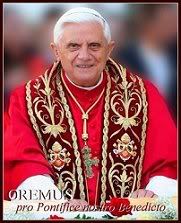 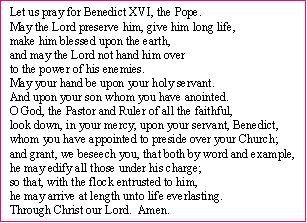 Posted today on the preceding page:
Posted today on the preceding page:
  
The Holy Father led the recitation of the Regina Caeli from the inner courtyard
of the Apostolic Palace in Castel Gandolfo, linked by TV to St. Peter's Square.
Homily in Italian see translation in AUDIENCE & ANGELUS TEXTS.
Pope mourns the death of Cardinal Adolfo Suarez Rivera, 81, emeritus Archbishop of Monterrey, Mexico,
who died of a cerebral hemorrhage. Text of the Vatican telegram in Spanish. Translated.
[Modificato da TERESA BENEDETTA 25/03/2008 00:39] |
|
 25/03/2008 00:39 25/03/2008 00:39 |
|
| | | OFFLINE | | Post: 12.556 | Registrato il: 28/08/2005
| Utente Gold | |
|
  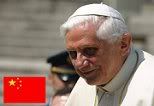 'We are moving ahead with the Vatican':
'We are moving ahead with the Vatican':
Liu Bainian is cautiously optimistic
By Francesco Sisci
Translated from La Stampa
3/23/08
At 74, without ceding to the vogue among Chinese polticians to dye their hair black, but with a thick shock of all-white hair and his ramrod-like soldier's spine, Anthony Liu Bainian is the last of the near-extinct species of Catho-Communists - an ex-seminarian, who failed to become a priest, but a fervent Catholic, who placed himself in the service of the Church's arch-enemy in the 20th century, Communism - and in one of its most extreme versions, the Chinese one.
Now that the 20th century is over, the Church has changed, Communism is all but obsolete, and China itself has turned substantially to the right, Liu remains almost all by himself one of the principal obstacles to normalizing diplomatic relations between the Holy See and Beijing. [In what way? The rest of the story does not substantiate this claim!]
He is, in fact, the head of the Catholic Patriotic Association, a semi-official state organization that unites all Chinese Catholics who owe loyalty to the Chinese government rather than to Rome.
It is the Association, and often Liu personally, that has been targeted by the militants of the underground Church who have remained faithful to Rome for decades. These militants consider the PA as the embodiment of betrayal, and Lui as the chief traitor.
Liu and the PA, on the one hand, and the militant underground Catholics, on the other, are the two shadows that loom ever larger as concrete realities - beyond the vari0us technical issues on the table - on the conversations going on behind the scenes between Beijing and the Vatican.
About these 'secret talks', Liu shrugs and says it is in the hands of the government, as it is a matter between states, not involving him nor the PA, but he adds that as far as he knows, "things are moving ahead, not backwards."
He also says that the Pope is welcome to come to China or "to send anyone he wants, as long as it takes place after normalization of diplomatic relations." And if such normalization could happen in time for the Olympics in July, so much the better, he adds.
Then, for the first time, Liu expresses a positive judgment on the Pope's June 2007 letter to the Catholics of China, which the Chinese authorities have so far not commented on. [I don't think he was ever negative about it! His first reaction in July 2007 was, in fact, to say, he wanted the Pope to visit China - and he did not put any conditions then.]
"The letter doesn't have any attacks against the Communist party and the PA, nor excommunication threats, as there were in the past," he says. "The problem, however, was that before coming to a political agreement with the government, the Pope affirmed his authority on the nomination of bishops. Also, the letter did not contain any excuses for the role of the Church in collaborating with the colonial powers that was in a 2002 letter from John Paul II". [???This statement about a JP-II letter should be checked out, but right now, I don't have the time.]
What are the issues that divide the official Church and the underground Church?
In the faith, as we have always said [ Liu looks at me directly], there is only one Church in China - and everyone is faithful to the Pope in the faith. The difference is merely political: the attitude towards the Communist Party.
But in politics, the Holy See is not always right. The Gospel says, "Render unto Caesar's that which is Caesar's, and to God that which is God's". In the Second World War, the Pope was against the war, but Mussolini ordered Italian soldiers into battle, and the Italians, mostly Catholics, obeyed and went to war.
Today, the Pope has condemned the war in Iraq many times, but there are many Catholics among the American soldiers fighting in Iraq. What are they supposed to do - obey the Pope and refuse to fight? No, they obey their government. These are political matters and they should be left to the politicians. But in matters of faith, one must obey the Pope. That is imperative.
[The interviewer might have intervened briefly to point out to Liu that a) the Church is in no position to impose anything whatsoever on the faithful - it can only preach, exhort, advise - on anything - but it has no coercive power, and b) that in modern times, the Church has never imposed its opposition to any war on the faithful, who are free to carry out their civic duties under the law, or to register conscientious objection if they wish to! The Church sends its chaplains to minister to American soldiers in Iraq and Afghanistan, without ever calling on them to abandon their sworn duties as soldiers of the United States armed forces! In fact, the chaplains themselves are members of the armed services.... More importantly, the Pope himself in his June 2007 letter to the Chinese Catholics advised them to obey their civic duties, citing precisely the line about Caesar and God.]
What then is the role of the Patriotic Association?
In China, 90 percent of the population are non-believers. Believers are a minority, and among them, by far the most numerous are the Buddhists. Catholics are very much a minority within a minority. These are the objective facts in China. Therefore, as Catholics in this tiny minority, we need the protection of the government against any eventual abuses by the majority.
Moreover, through the PA, the Catholic Church in China has grown. At the start of the 1950s, China had 52 bishops and some 1,100 priests, most of who were older than 60. In 1990, we had 1,800 pruiests, of whom only about a hundred were older than 60 - most being in their 40s. Today we have 170 bishops. In the 1950s, there were 2.2 million (official) Catholics - now there are almost 5 million.
How many are there in the underground Church?
I don't know. But through our efforts, many are now agreeing to be registered. Others still don't want to. But among those who refuse, there are people with serious moral problems, including married priests. In the PA, we are much more strict. But I understand what is happening.
What do you mean?
I was a seminarian in 1949, and I was very fervent. But my teachers told me that I should fight Communism, otherwise I would lose my soul. I was ready to die in order to save my soul. I was very active (against the Communists), but my uncle was even more active. I had many problems because of my activism. But in 1951, my auxiliary bishop caused me to change my mind. He said that it was right to love your own country, that the Catholic faith is love and it cannot exclude love for one's country.
La Stampa, 23 marzo 2008
The interview sounds unfinished!
[Modificato da TERESA BENEDETTA 25/03/2008 03:08] |
 25/03/2008 04:41 25/03/2008 04:41 |
|
| | | OFFLINE | | Post: 12.559 | Registrato il: 28/08/2005
| Utente Gold | |
|
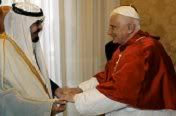 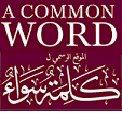 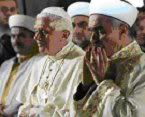  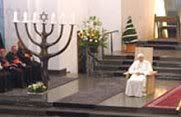 SAUDI KING PROPOSES INTER-FAITH
SAUDI KING PROPOSES INTER-FAITH
TALKS TO INCLUDE JUDAISM
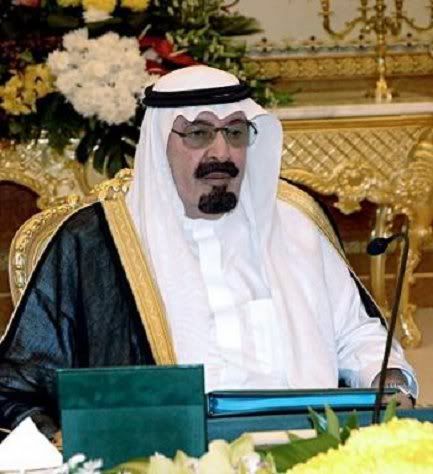
RIYADH, March 24 (AFP) — Saudi Arabia's King Abdullah on Monday proposed inter-faith talks between Muslims, Christians and Jews in a first for the ultra-conservative Muslim kingdom, the official SPA news agency reported.
"I ask representatives of all the monotheistic religions to meet with their brothers in faith," the king told delegates to a seminar on "Dialogue Among Civilisations between Japan and the Islamic World."
SPA reported that top Saudi clerics had given the green light for the idea, and that Muslim leaders from other countries would now be consulted.
The king said he had discussed the project, which he has been mulling over for two years, with Pope Benedict XVI during his landmark visit to the Vatican last November.
"If God wills it, we will then meet with our brothers from other religions, including those of the Torah and the Gospel... to come up with ways to safeguard humanity," the king said.
The news agency said he also intended to address the United Nations on the subject.
"We have lost sincerity, morals, fidelity and attachment to our religions and to humanity," the king said, deploring "the disintegration of the family and the rise of atheism in the world -- a frightening phenomenon that all religions must confront and vanquish."
The monarch did not say where he hoped the proposed dialogue would take place.
The Italian news agency APCOM, reporting the same thing as above, but citing the London-based pan-Arab ewspaper al-Hayat as its source, adds this detail, translated here:
King Abdullah, in referring to his visit with Pope Benedict, also said: "I thank the Pontiff for how we welcomed me. It was a man-to-man encounter."
======================================================================
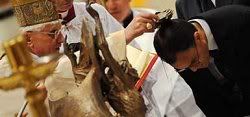  Meanwhile, after Richard Owen's Easter Sunday provocatory initiative in the Times of London that Magdi Allam's conversion was likely to raise the ire of the Muslim world all over, the British news agency Reuters follows it up with this report purveying the predictable views of a British-based Muslim critic of Catholicism - one of those in the preparatory working group for the Catholic-Muslim Forum. Although itt looks as if the "British' campaign did not get to King Abdullah, going by the report above from Riyadh!
Meanwhile, after Richard Owen's Easter Sunday provocatory initiative in the Times of London that Magdi Allam's conversion was likely to raise the ire of the Muslim world all over, the British news agency Reuters follows it up with this report purveying the predictable views of a British-based Muslim critic of Catholicism - one of those in the preparatory working group for the Catholic-Muslim Forum. Although itt looks as if the "British' campaign did not get to King Abdullah, going by the report above from Riyadh!
First of all, it's the Owens and the Heneghans and the Nayeds of the world who are making too much of the conversion. It isn't as if Allam had been a practising Muslim at all. A long-lapsed and disillusioned Muslim finally deciding to become Christian is a whole lot different from say, someone like Nayed, or maybe a member of the royal house of Saud or of Jordan giving up Mohammed for Christ! And why is the British media so perverse????
Muslims question Vatican baptism
of Islamic critic
By Tom Heneghan, Religion Editor
PARIS, Mar. 24 (Reuters) - The Easter baptism of an Italian Muslim by Pope Benedict was a provocative act that raises questions about the Vatican's approach to Islam, a leading participant in Christian-Muslim dialogue said on Monday.
Aref Ali Nayed, a key figure in a group of over 200 Muslim scholars launching discussion forums with Christian groups, said the Vatican had turned the baptism of Egyptian-born journalist Magdi Allam into "a triumphalist tool for scoring points." [Honi soit qui mal y pense!]
He said the Vatican should distance itself from a searing attack on Islam that Allam published on Sunday in the Milan daily Corriere della Sera, where he is a deputy director.
Commentators in Algeria and Morocco echoed Nayed's view, saying Allam's conversion was a personal affair but his attacks on Islam and his headline-grabbing baptism by the Pope strained relations between Muslims and the Catholic Church.
"The whole spectacle... provokes genuine questions about the motives, intentions and plans of some of the Pope's advisers on Islam," Nayed, who is director of the Royal Islamic Strategic Studies Centre in Amman, said in a statement. [EEEWWWWW! Let it be said that Nayed was one of the most assiduous critics of the Pope's Regensburg lecture, Sandro Magister published two or three of his polemics against the Pope at the time. Talk about headline-grabbing!]
"Nevertheless, we will not let this unfortunate episode distract us from our work on pursuing 'A Common Word' for the sake of humanity and world peace. Our basis for dialogue is not a tit-for-tat logic of reciprocity."
Nayed was one of 138 Muslim scholars who last October issued an unprecedented appeal entitled "A Common Word" that urged a serious dialogue between Christians and Muslims on the basis of the shared values of love of God and neighbour. Dozens more scholars have since signed the appeal.
Protestant churches have mostly reacted in a positive way, but the Roman Catholic Church -- which accounts for more than half of the world's two billion Christians -- has been hesitant and agreed to dialogue only after some delay.
A "Common Word" delegation met Vatican officials early this month in Rome and agreed to a formal dialogue session in November during which they will meet Pope Benedict.
In his statement, issued after consulting several other signatories of the dialogue appeal, Nayed said Allam's conversion was his personal decision and asked whether he had been influenced by Catholic schools he attended as a child.
He said it was "sad that the particular person chosen for such a highly public gesture has a history of generating, and continues to generate, hateful discourse." Allam has been a fierce critic of radical Islam and defender of Israel.
Mohamed Yatim, commentator for the Moroccan daily Attajdid, called the high-profile baptism "a new provocation for the Islamic world and part of a trend that has intensified in recent years with the caricatures of the Prophet."
Cartoons of the Prophet Mohammad printed by some European newspapers sparked widespread riots in the Muslim world in 2006.
In Algeria, deputy editor Mahmoud Belhimer of the popular El Khabar newspaper said Allam's conversion "could have been normal if he had not made anti-Islamic comments." [Allam's comments were against Islamists extremism and terrorism.]
The Saudi daily al-Watan reported the baptism on its front page and described Allam as someone who "worked tirelessly to attack Islam" and was close to pro-Israel groups.
Rev. Christophe Roucou, the French Catholic Church's top official for relations with Islam, also questioned the publicity surrounding Allam's conversion. "I don't understand why he wasn't baptised in his hometown by his local bishop," he said.
(Additional reporting by Hamid Ould Ahmed in Algiers, Thomas Pfeiffer in Rabat and Andrew Hammond in Riyadh; Editing by Dominic Evans) - who all obviously went out of their way to solicit contrary opinions! If this isn't trying to manufacture a crisis, I don't know what it is!.
3/25/08
P.S. The Italian news agency APCOM now has filed a story which posts the complete statement of Nayed, parts of which are cited in the Reuters story above. Those of you who have read Nayed's disquisitions, as shared with us by Magister over the past two years, know he can go on and on....He does in this statement, too. I'll see if I can find time to translate all of it - or maybe Magister will povide a translation earlier than I can.
The unfortunate thing about the Apcom story is that it makes it appear Nayed is making his personal statement in behalf of all the other signatories of A COMMON WORD! Of course, the latter may later issue a statement saying they agree to everything Nayed says....
P.P.S. And now, alack and alas, AP has also picked up Nayed's statement, which is, of course, provocation piled on provocation. Can the firestorm be far behind? Didn't I say when I first read that Nayed was part of the preparatory committee for the Catholic-Muslim Forum - watch out for this man: he is DANGEROUS! He's out to build a worldwide personal 'reputation' based on contradicting and denouncing the Pope whenever he can, under cover of his Cambridge credentials- now reinforced by his role in the Jordanian institute that initiated A COMMON WORD and his role in the Catholic-Muslim Forum! He should resign from that Forum on the ground of partisanship and lack of objectivity!
Muslim scholar denounces
Vatican baptism
By FRANCES D'EMILIO
VATICAN CITY, Mar. 25 (AP) — A Muslim scholar who participated in recent Vatican talks to improve Catholic-Muslim relations criticized Pope Benedict XVI's Easter baptism of a prominent convert from Islam as a "provocative" act.
Magdi Allam, an Egyptian-born TV and newspaper commentator who has denounced Islam as inherently violently, was baptized by the pope in a vigil service Saturday night in St. Peter's Basilica.
Aref Ali Nayed, director of the Royal Islamic Strategic Studies Center in Amman, Jordan, criticized what he called "the Vatican's deliberate and provocative act of baptizing Allam on such a special occasion and in such a spectacular way."
"It is sad that the intimate and personal act of a religious conversion is made into a triumphalist tool for scoring points," Nayed said in a written statement.
He added that the baptism came "at a most unfortunate time when sincere Muslims and Catholics are working very hard to mend ruptures between the two communities."
Earlier this month, Nayed participated in two days of talks at the Vatican to prepare for an audience in November between the pope and Muslim religious leaders and scholars. Benedict's top official on inter-religious dialogue, Cardinal Jean-Louis Tauran, was among the participants.
The Vatican newspaper L'Osservatore Romano denied that the baptism had been played up, saying it was kept secret until just before the ceremony. It described the baptism as a papal "gesture" to stress "in a gentle and clear way, religious freedom."
"There are no hostile intentions toward a great religion like that of Islam," the newspaper wrote.
The Vatican has been eager to mend relations with moderate Islam and has placed a great deal of importance on the upcoming audience with representatives of 138 Muslim scholars who wrote to the Pope last year calling for greater Muslim-Christian dialogue.
Their call came after Benedict gave a speech in 2006 citing a medieval emperor's words about Islam and violence. Benedict later expressed regret that the speech angered many in the Muslim world.
Nayed said work to improve relations would continue despite the "unfortunate episode" of Allam's baptism.
Allam, a deputy editor of Milan daily Corriere della Sera, has built his career as commentator and book author attacking Islamic extremism and supporting Israel. [That's very unfair to Allam - he did not build his career on that! From what I have read about him, he was able to reach a point where he could do it, only after he earned his journalistic spurs the regular way and rose to become deputy editor at Italy's msot prestigious newspaper.]
In a Sunday piece for Corriere della Sera, he said the "root of the evil is inherent in an Islam that is physiologically violent and historically conflictual." [I think D'Emilio should have specified that the 'piece' was not a regular article but a letter to the editor in which Allam specifically begins by saying he is writing as a private individual and not as a journalist or staffer of Corriere.. I posted a translation of Allam's full letter in NOTABLES yesterday!]
On Tuesday, Ugo Intini, Italy's deputy foreign minister for Middle East affairs, criticized Allam's "very harsh condemnation" of Islam.
In an unusual appeal in a country where the government is highly respectful of the Holy See, Intini called on the Vatican, "after the emphasis given to Allam's conversion, to distance itself clearly from his statements." [What's to distance? Allam makes it very clear he is speaking on his own behalf, not of the Church - and OR has already made what one must see as the official position of the Vatican on the whole event!]
WHAT DOES IT SAY OF MSM THAT THEY HAVE VIRTUALLY IGNORED THE SAUDI KING'S INITIATIVE FOR A MULTI-FAITH DIALOG IN FAVOR OF THE ALLAM STORY?
HOW CAN ONE EVEN BEGIN TO COMPARE THE POTENTIAL OF WHAT THE KING OF SAUDI ARABIA CAN DO WORLDWIDE - AND MAGDI ALLAM'S INDIVIDUAL EFFORTS AS A JOURNALIST - OR EVEN THE PRESTIGE OF THE ROYAL HOUSE OF JORDAN BEHIND 'A COMMON WORD'?????
[Modificato da TERESA BENEDETTA 25/03/2008 23:50] |
 25/03/2008 06:24 25/03/2008 06:24 |
|
| | | OFFLINE | | Post: 12.563 | Registrato il: 28/08/2005
| Utente Gold | |
|
Osama and the Pope
by Susan Easton
Human Events
03/24/2008
An interesting synthesis of recent developments in the broader context of Catholic-Muslim relations, up to the Allam conversion.
In early March, the media had a field day announcing that Pope Benedict XVI had issued a list of “new sins.” As with many reports on religion, the new sins articles were slathered with self-satisfied secular glee. They were also wrong.
The story started spinning when comments -- made to a group of priests by a Cardinal on the subject of hearing confessions -- were made public. The Cardinal’s goal was to underscore that moral choices were not limited to what we did when alone, but also included what we do as citizens of the world.
Hence, the Cardinal’s focus on caring for the environment, preventing pollution, and ending poverty, as acts of social responsibility. The Pope was asked to comment on the Cardinal’s remarks when he met with the group later, but there was no list. The Pope didn’t try to upstage Moses or Jesus.
Thankfully the spin cycle was abbreviated by Wednesday of Holy Week, (March 18th), when the attention of the media was transfixed by the latest pronouncement from the elusive Al Qaeda mastermind. His words inspired Matt Drudge to run an all caps red-letter headline: “Bin Laden Slams Pope.”
Certain members of the press sustained a serious case of whiplash. More than one must have (secretly) wondered how that purported list
of new sins could have caused Bin Laden to go ballistic at Benedict.
Then came the transcript of the tape in which Bin Laden attributed his wrath to the planned reprinting of a dozen controversial Danish cartoons, first published two years ago, that satirize Islam and the Prophet Mohammed.
This time around, Bin Laden was not focusing his threats solely at the Danes. This time he told the entire EU to beware. And -- just in time for Easter -- Osama shared his latest pet conspiracy theory. He asserted that the decision to reprint the cartoons was part of a nefarious Papal plot designed to gin up a new Christian Crusade against the Muslim world.
Nice cover story, but there are several other provocations afoot -- any one of which could have put the wind up the terrorist kingpin.
Back on March 5th, Vatican officials and a visiting group of five Muslim leaders agreed to establish a permanent dialogue. The first meeting of The Catholic Muslim Forum is scheduled for early November of 2008 in Rome. The Pope will deliver a message to the 24 attendees.
This announcement comes two years after remarks Benedict made -- at his former university home, in Regensburg, Germany -- which angered many Muslims. A passage in the Pope’s speech was interpreted as an accusation that that Islam was violent and irrational.
The misunderstanding, for which the Pope expressed regret, resulted in the deaths of about 50 people and a bit of property destruction by indignant Islamists. It also prompted 138 Muslim scholars to pen and sign “A Common Word,” an appeal for the Vatican and other Christian church leaders to enter into a dialogue because “the very survival of the world itself” depended on it. [Ms. Easton has the horse after the cart, here. Regensburg was a call for dialog - A Common Word was a response that came more than one year afterwards.]
Since the document was created, the number of Muslim signatories has grown to 240. As Ibrahim Kalin, of Turkey’s Seta Foundation, noted: “Muslims and Christians make up about 55 percent of the world and there will be no peace in the world unless there is peace between the two communities.” Of course, the crucial question for many will be: Peace at What Cost?
Osama is -- no doubt -- also reeling from fresh territorial issues. Only days before his Crusade tirade, the first (ever) Catholic Church opened its doors in Doha, Qatar. Services at Our Lady of the Rosary will be held in 14 languages to accommodate the estimated 150,000 -- predominantly Catholic Christians -- from 100 countries, who reside in Qatar.
The first worship service -- attended by thousands of people -- was held under heavy security, but it went off without disruption. The mass was led by the Pope’s special envoy, the Prefect of the Congregation for the Evangelization of Peoples, (a red flag title if there ever was one to devout Muslims) Cardinal Ivan Dias.
Vatican Radio described this event as one “of historical importance which, after 14 centuries of prohibitions, sees a place of worship for Catholics established.”
Mind you, the building in which worshippers gather has no outward symbols of Christianity -- no crosses or bells -- but the land on which the structure stands was donated by Qatar’s Emir (Sheikh Hamad Bin Khalifa Al-Thani) - in power since a coup in 1995.
The Emir favors interreligious dialogue. Not so all of his ministers, one of whom has asked for a countrywide referendum before other Christian churches are approved.
That same week, news began to circulate that the Vatican was negotiating to open a Catholic Church in Saudi Arabia. This possibility emerged following King Abdullah’s visit to the Vatican last November, where he was welcomed by the Pope.
The man in charge of this dialogue is Archbishop Mounged El-Hachem, the papal envoy to Kuwait, Qatar, Bahrain, Yemen and the United Arab Emirates. That title speaks volumes.
Although all Saudi citizens are required by law to be Muslims, opening a Catholic church in Saudi is viewed -- by both parties -- as a sign that reciprocity and respect between Islam and Christianity is not impossible.
Now if 9-11 was a protest against the US military presence in the Middle East, most specifically Saudi Arabia, just imagine how annoyed Bin Laden must be about King Abdullah giving permission for Christian churches to be established on Muslim turf. [That's what I commented when the Osama news came out!]
But wait -- there’s more.
The Saudi Arabian government has just announced that 40,000 Imams will be “retrained” to eliminate extremist tendencies in their teachings. (Maybe they can reserve a space for Rev. Wright) [Jeremiah - Barack Obama's race-baiting, America-damning pastor and friend of 20 years.]
According to Al-Sharq al Awsat, a prominent Saudi newspaper, five years ago, a Saudi Ministry of Religious Affairs and Center for Religious Dialogue was inaugurated to disseminate a more moderate interpretation of Islamic tradition and encourage religious tolerance. Imam retraining is part of the plan.
Since the Center was created, at least 1000 Imams -- judged to be inciting youth to join the global jihad -- have been banished from their mosques.
When King Abdullah visited the Bush Ranch in Texas, there were snickers about oil and family deals. But it turns out that the President was negotiating with the Saudi King to “rein in” militant clerics. Some observers are quick to point out that this may only be an exercise in superficial shuffling for the sake of appearances. Time will tell.
Another straw -- piled on to help break the camel’s back -- came during the Easter Vigil this past weekend when the Pope officiated at the baptism of seven people. Among that select group was the Egyptian (and Muslim) born Magdi Allam -- now a Catholic convert -- who serves as Deputy Editor of Italy’s Corriere delia Sera paper and is a noted commentator on Muslim and Arab Affairs.
Small wonder Osama is succumbing to dark conspiratorial thoughts. He must be terrified to ask himself “What next?”
|
 25/03/2008 17:25 25/03/2008 17:25 |
|
| | | OFFLINE | | Post: 12.568 | Registrato il: 28/08/2005
| Utente Gold | |
|
 

 Holy Week:
Holy Week:
The 'Hidden' Homilies of Pope Benedict
by Sandro Magister

ROMA, March 25, 2008 – Of the six homilies delivered by Benedict XVI during the Holy Week ceremonies this year, only two had wide reverberations and reached the ears of millions of people.
The first was the one read at the end of the Via Crucis on Holy Friday, and the other is the "Urbi et Orbi" message of Easter Sunday. Both of these were broadcast live on radio and television, in many countries around the world.
But not the other four. They reached few – only the few thousands of the faithful who were present at the ceremonies celebrated by the pope, and who understood the Italian language (many of them were foreigners). To these should be added the few people who read the pope's words in the Catholic media during the following days.
If one considers that Catholics in the world number well over one billion, the number of those who heard or read the pope's homilies last Holy Week appears even more microscopic.
And yet these homilies are among the most revealing characteristics of Joseph Ratzinger's pontificate. They are a culmination of the magisterium of this pope, theologian and pastor.
They are unmistakably written by the pope himself. And they are inseparably connected to the liturgical celebration in which they were pronounced. In their genre, they are masterpieces.
The comparison that comes most naturally is with the homilies of the Fathers of the Church, for example, those of Leo the Great – the first pope whose liturgical preaching was preserved, of Saint Ambrose, of Saint Augustine.
It is an illuminating comparison under the aspect of communication as well. Because even the homilies of a Leo the Great, at the time, were heard by few and read by fewer. The same can be said of Saint Augustine. But the influence that the preaching of these Fathers had upon the Church was equally great, and was produced over the span of centuries.
It is not impossible that something similar could happen with the homilies of Benedict XVI. All that is necessary is that there be, in the Church, persons who recognize the originality and depth of the liturgical preaching of this pope. And who work to expand its audience.
Benedict XVI's book about Jesus, his encyclicals, his great addresses on faith and reason and have all made news. For some time, interest has also been kindled in his Wednesday audiences, dedicated first to the Apostles and now to the Fathers of the Church.
But so far the same kind of attention has been lacking for his homilies. And yet it is enough to read those for Holy Week of this year – reproduced below – to understand how central these are in the magisterium of Pope Benedict.
It is astonishing that the communications machine of the Holy See has so far neglected them. L'Osservatore Romano publishes them quickly, but for a readership that is too restricted, since the newspaper still does not make adequate use of the internet.
The Libreria Editrice Vaticana has not yet published any books compiling the homilies of Benedict XVI, either in their entirety or according to the various liturgical periods, for example the Christmas homilies, or those of Easter, which would ideally be accompanied by the scriptural passages of the liturgies of which they were part.
Magister then provides the complete texts of the six homilies of Benedict XVI for Holy Week of 2008, in English translation.
Since I make it a point to provide translations of the Pope's texts as soon as I can for the Forum, under any circumstances, those of you who follow the Forum regularly may have already read my translations of the first four homilies. I was so taken by the Mass of the Chrism homily intended primarily for priests that I excerpted a great part of it to post a comment in POPE-POURRI.
The Vatican itself provided the English translations of the Easter Vigil homily and the Urbi et Orbi message at the time they released the original texts.
All six may be read in the HOMILIES, DISCOURSES, MESSAGES thread. And here is the link to Magister's translator's versions, in case you wish to compare the texts.
chiesa.espresso.repubblica.it/articolo/195041?eng=y
=====================================================================
Now, allow me to comment, as the heartbreakingly deficient media 'coverage' of the Holy Father by the Vatican itself [the whole gamut of 'coverage' - reporting, writing, filmng, recording, broadcasting and dissemination to all bishops and priests around the world to begin with, and then to the one-billion faithful] - is an issue I find so frustrating I tear out my hair and flail about in rage whenever I think of it.
And as conscientious as Sandro Magister is in calling attention to these deficiencies, his articles have obviously not done anything to improve the situation one iota. The same deficiencies that were there when Benedict XVI became Pope and inherited the whole apparatus that Joaquin Navarro-Valls and Mons.(now Cardinal) Foley built up over more than 20 years are still there today!
Magister wrote a similar article a few months back, when he featured a series of six mini-homilies delivered by the Holy Father at the noonday Angelus gatherings in St. Peter's Square.
And, as in the case of his recurrent pieces complaining about the execrable state of TV coverage by the Vatican itself of papal liturgies, I made the same comment then:
Why can he not - with all his personal clout as a Vatican correspondent with international following, and that of the Mondadori chain that he works for, and being a resident in Rome and an accredited Vatican correspondent - request a face-to-face conversation with Fr. Lombardi and/or Mons. Celli - who are directing the Vatican's communications apparatus - to confront them with the problem? So they can do something right away to employ the worldwide resources they have to best disseminate the Magisterium!
And what is keeping Fr. Lombardi and Mons. Celli and all those experienced, intelligent heads at the Vatican from doing something about these obvious disservices to the Holy Father and to the message/mission of the Church? What did Cardinal Foley - a media-savvy man from Philadelphia - do all those 20 years as director of social communications for the Vatican under John Paul II? Does the Vatican's so-called 'social communications' apparatus worry only about reaching the general media? What a joke, to rely on the general media to spread the word regularly and right!
The communications effort should be focused primarily on the priests and bishops and seminaries and Catholic schools throughout the world - on the understanding, of course, that they pass it on in a timely manner to the parishioners and the public tthat hey serve!
Surely, there must be at least one organism in the Vatican - the secretariat of State, or the Congregation for the Clergy, or the Congregation for Bishops - that must make it one of its primary responsibilities to compile and update the e-mail addresses of each and every Catholic priest (at least the parish priests) and bishop in the world [and by extension, the e-mail of every Catholic institution of learning and national Catholic organizations] - so that mass mailings can be made to them every time there is something to be communicated to the universal Church. [Of course, there will be parishes so remote, or so poor, they may not have any e-mail capability at all. But the local bishop should attend routinely to keeping lines of communication open with such parieshes and priests, anyway.]
As things stand, that 'something' is more often than not, the Pope's words. I expatiated on this before, to the effect that if the papal texts were immediately disseminated in English and Spanish, to begin with, to every parish priest in the world, it would be understood by at least 90% of them - enough to be passed on in usable form to their parishioners through some simple diocesan and parish level mechanism.
The Osservatore Romano, even if it evolves into the best newspaper in the world, is obviously not an organ of mass dissemination. It serves as an official reference point about what matters to the church and to the Pope in terms of what must be communicated - it cannot and will never be by itself the primary source of information about the Pope and the Church for the great majority of the faithful, not even for the bishops and priests - and not even when OR goes online in its entirety.
The Internet is there - it's free, it's instantaneous, and it is universal. The Vatican already has a sophisticated multi-site, multimedia IT system going on - it just is not being used the best way possible.
P.S. The Vatican had better light a fire under the a.... of its translators, too. There is absolutely no reason not to come out with a translation of a papal text (unless it is an encylical or a book) within 24 hours, even if it must be labelled 'unofficial and provisional' initially.
[Modificato da TERESA BENEDETTA 25/03/2008 23:22] |
 25/03/2008 20:10 25/03/2008 20:10 |
|
| | | OFFLINE | | Post: 12.569 | Registrato il: 28/08/2005
| Utente Gold | |
|
 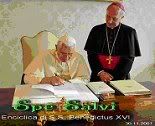 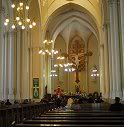 Strip shows exterior and interior views of the Catholic Cathedral in Moscow.
'Spe salvi' presented
Strip shows exterior and interior views of the Catholic Cathedral in Moscow.
'Spe salvi' presented
in Moscow today
MOSCOW, March 25 (AsiaNews) – The Russian translation of the encyclical Spe Salvi is being presented today in the Russian capital. The event, according to its’ organisers, “represents an occasion for an encounter and dialogue between the Catholic Church and Russian Church”.
The presentation was to take place at the offices of the cultural cetner called Library of the Spirit, with the participation of the Catholic Archbishop of Moscow, Paolo Pezzi, and Fr. Vladimir Shmalij, secretary of the Synod Theological Commission of the Orthodox Patriarchate and vice-rector of the Sergiev Posad theological academy.
The publication of the encyclical was organised by Franciscan Editions, the Apostolic Nunziature and the Catholic news agency Agnuz.
In 2006, the Library of the Spirit launched the Russian edition of Introduction to Christianity, written by the then Cardinal Ratzinger. The foreword to the edition was written by Metropolitan Kirill, who ranks after Patriarch Alexei-II in the Patriarchate of Moscow.
The Library of the Spirit was opened in Moscow in 1993 by the Christian Russia Foundation together with the Orthodox Centre of Sts. Cyril and Methodius of Minsk and Caritas Moscow.
Through this organization, Catholics and Orthodox work side-by-side, promoting opportunities for discussion adn ecumenical dialog through encounters, exhibitions and publications.
Vatican Radio's Italian service had this interview today with Archbishop Pezzi:
'A positive step
in the ecumenical dialog'
Translated from the
Italian service of

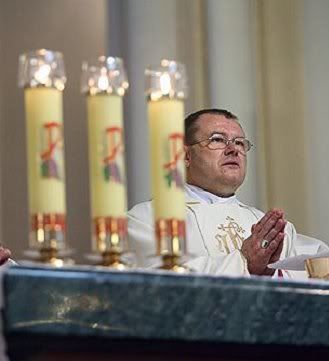
"There is no stepping back, since there never was a scheduled meeting," said Archbishop Paolo Pezzi, Archbishop of Moscow, to the Italian news agency SIR today, after some newspapers reported the 'cancellation' of a meeting between Pope Benedict XVI and Patriarch Alexei-II, head of the Russian Orthodox Church.
Mons. Pezzi pointed out that the Patriarch had sent an Easter message to the Pope in a sign of 'Christian communion' and that the Pope's second encyclical was being presented in Russian today in Moscow.
Alessandro Gisotti interviewed Mons. Pezzi about the presentation:
MONS. PEZZI: The organizers decided - and I think happily - to have the presentation done by two persons. I would introduce the encyclical - in which I wish to stimulate a desire to read it and to get to know the encyclical well - and then Fr. Vladimir Shmalij will talk about how the encyclical has been received in Orthodox circles and the reactions to it.
It is significant that this is the second work of Joseph Ratzinger to be translated into Russian in less than a year. What interest is there in Russia in the Magisterium of Benedict XVI?
First of all, there is great academic interest. The words and thoughts of this Pope are original but they do not stray from the traditional content of Christianity - and this is very important for those who reflect on these writings within the Russian Orthodox Church. It is a thought that makes the content of tradition actual and relevant for the present.
The second aspect which makes the Pope's writings interesting is that he enters into the concerns and preoccupations of man today. We saw that very well in Deus caritas est, in which he presents the theological virtue of love from the perspective of man's need today to live the dimension of love.
How can the encyclical help to promote ecumenism and dialog, and the friendship between Catholics and Orthodox in Russia?
I think that even if ecumenical dialog is not a specific topic in this encyclical, a concern for ecumenism is apparent in some highlights, such as the section on the Last Judgment, and what it says about a necessary purification, namely, purgatory, after death. I think it is this kind of theological initative that contributes to the development of the ecumenical dialog.
Thus, an important document like Spe salvi becomes the object of reflection by Orthodox thinkers and stimulatexs all kinds of reaction to what it says. I see this as very positive for dialog.
[Modificato da TERESA BENEDETTA 25/03/2008 21:14] |
 25/03/2008 20:16 25/03/2008 20:16 |
|
| | | OFFLINE | | Post: 318 | Registrato il: 17/05/2006
| Utente Senior | |
|
Re: the Holy Father's homilies Teresa, I share your frustration in this regard, as you know. May I suggest, or rather ask, something? Can't you write to Magister and put your suggestions to him? Your Italian is perfect and he will respond, as he did once when I wrote to him in connection with Catholic Church music - and my letter was written in English!
I'm sure you can even add that you write in behalf of everyone belonging to this forum. (If the members feel like you do, which I presume is the case.)Magister should be encouraged to speak to those in the Vatican who can change this sad situation. Perhaps he has done so already, to no avail? Oh dear....
======================================================================
In fact, last year, I e-mailed one of my rather exasperated comments about this whole media mess to Fr. Lombardi himself, with a respectful accompanying note, through one of the links available on the Vatican Radio site (of which he is still the director), but got no acknowledgment.... I'll try again with this one, and copy-furnish Mr. Magister. TERESA
[Modificato da TERESA BENEDETTA 25/03/2008 23:27] |
 26/03/2008 01:31 26/03/2008 01:31 |
|
| | | OFFLINE | | Post: 12.571 | Registrato il: 28/08/2005
| Utente Gold | |
|
  This short Page 1 editorial from the issue of L'Osservatore Romano for March 25-26 was probably intended as a preemptive statement rather than a reaction to something like Aref Nayed's statement accusing the Vatican of turning Allam's baptism into a 'triumphalist tool for scoring points'. The man is a Pavlov's-dog reactionary!
This short Page 1 editorial from the issue of L'Osservatore Romano for March 25-26 was probably intended as a preemptive statement rather than a reaction to something like Aref Nayed's statement accusing the Vatican of turning Allam's baptism into a 'triumphalist tool for scoring points'. The man is a Pavlov's-dog reactionary!
The Reuters and AP stories based on Nayed's statement are in the post earlier on this thread, which starts with the story out of Riyadh, from official Saudi sources, about King Saud's plan to bring about a dialog (or trialog) among the world's three monotheistic faiths.
Religious freedom and dialog
Translated from the
March 25-26 issue of

The heart of the Christian year, Easter calls on every man and woman - those who are baptized as well as those who are simply in search of the truth - to conversion.
That is why, from the earliest times, the liturgy of the Church provides for the baptism of neophytes during the Easter Vigil and the renewal of baptismal promises by those who are already baptized.
On the death and resurrection of the Word incarnate - an event that truly 'changed the course of history' - Benedict XVI meditated profoundly during the celebration, baptizing at St. Peter's Basilica seven adults coming from every part of the world, to whom he later administered Confirmation and Communion as well, as has become traditional every year in the papal liturgy for Easter Vigil.
Among the seven is an Egyptian-born Italian journalist, Magdi Allam, deputy editor ad personam of Corriere della Sera, the most important Italian newspaper. Allam, after a long personal quest and the preparations necessary for this step, freely asked to be baptized with the name Cristiano.
The event, which was as singular as it was solemn and joyous, was not played up [by the Vatican], as shown by the silence that was maintained about it until the last moment, just before the Easter Vigil ceremonies began, when the director of the Press Office, Fr. Federico Lombardi, said: The Pope does not make 'distinctions among persons', who are all important in the eyes of God and are all equally welcome to the community of the Church.
Benedict XVI's gesture at the same time has an important meaning because it affirms religious freedom in a clear and gentle way. Religious freedom is also the freedom to change religion, as it was underscored in 1948 in the Universal Declaration of Human Rights (even if, subsequently and unfortunately, the declaration was amended on precisely this point). Therefore, anyone who, without constraints, asks for baptism has the right to receive it.
Just as there was no undue emphasis made [on Mr. Allam's baptism], likewise there was no hostile intention towards a great religion like Islam. For many decades, the Catholic Church has shown a readiness for confrontation and dialog with the Muslim world, nothwithstanding a multitude of difficulties and obstacles.
But difficulties and obstacles should not obscure what we have in common and what can come inthe future, as stated in the conciliar declaration Nostra aetate, and since then, repeated often by the Roman Pontiffs.
With baptism - Benedict XVI said during the Vigil and later in his traditional Easter messaage to the city and to the world, the light of God enters us to transform the very shadows, and Easter signifies that Christ is 'the true hope for every human being' - calling on everyone to conversion and penitence - that is, "to live, rejecting all hatred and selfishness". Because truly, in the love of Christ, "the heart of God and the heart of man come together".
======================================================================
From that moment on Saturday night when I saw the Vatican statement about Allam being among the adults to be baptized by the Pope that night, I dreaded that it was inevitably going to get the lion's share of the reporting and commentary in MSM.
I am still praying this story will not become endless fodder for fresh indignation from Muslim extremists and other self-serving elements in the Muslim world as I believe Mr. Nayed is - and has been from the time I read his first reaction to the Regensburg lecture.
======================================================================
The newspaper Libero published this interview with Allam today.
"Christian at last, and happy -
thanks to the Pope'
By BARBARA ROMANO ROMA
Translated from
Libero, 3/25/08
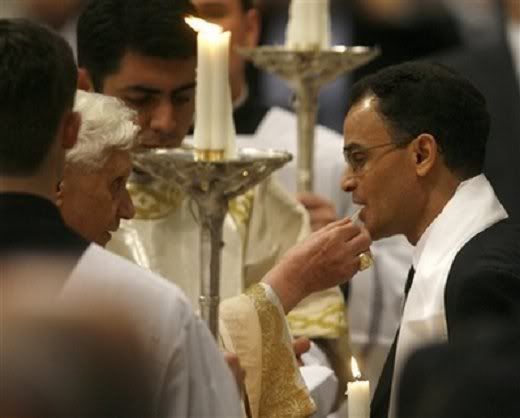
What would it be like to change one's name when one is 56? We asked that of Magdi Allam who is now Christian. In fact and in name. Baptized, confirmed and given First Communion. Three in one, By Papa Ratzinger himself. And on Easter night. At St. Peter's Basilica. Remarkable for someone who was Muslim.
"It's not just the name. It's my entire life that has changed. It means nullifying everything that went before, starting anew in the sign of a new faith, based on values I have always believed in and defended, but which have now become more consolidated in me - in participation with so many other Christians who until now were friends but who are now my brothers, too," he says.
So how should your friends call you now, Magdi or Cristiano?
I am keeping the name Magdi because it is what I was born with and how I am known, but integrating it with Cristiano - Magdi Cristiano Allam.... So it's a double name. That's not uncommon in Italy. I can be addressed with either name, it's fine.
[C ]Why did you choose Easter night and the Vatican for receiving the first sacraments?
It's customary around the world for the Church to give the sacraments of initiation into Christianity to catechumens at the Easter Vigil. So even at St. Peter's, the Pope administers baptism, confirmation and communion to a few adults representing the various continents,to underscore the universality of the Church.
Of course, but you are not just anyone. Until then, you were Muslim and have spent much of your life fighting Islamist extremism.
If we were in a normal country where religious freedom is truly protected by law, then we would not even be asking this question. But we are in a country where, if an Italian converts to Islam, nothing untoward happens to him as a consequence. But if a Muslim converts to Christianity, then he immediately receives a sentence of death for apostasy.
But isn't it true that by choosing the place, the date, and the 'priest' for your conversion, you were raising a provocation?
No. It's absurd to even imagine that I - much less the Pope - could be considered provocateurs of Islamic terrorism. It should be clearly understood that the right to religious freedom is inalienable and something to be affirmed clearly and openly.
Don't tell me you did not expect a severe reaction from the Islamic world!
I did consider the possibility.
Well, the Arab press has already launched a landslide of attacks against you and against the Pope...
I've been in this business for more than 30 years, and I know the Arab and Muslim worlds quite well. I have seen events which have been likewise considered provocative.
For example?
The Pope's lecture in Regensburg and the Danish cartoon showing Mohammed as a terrorist.
And did you not think that the Muslims might consider your baptism at St. Peter's a 'second Regensburg'?
It would not surprise me, but I don't intend to surrender nor be intimidated in any way. I know I am doing right. It would be an enormous mistake to give in to the threats of those who through repirsals and condenations imagine they can conquer our minds and subjugate our spirit.
Who proposed the idea of the Easter Vigil baptism at St. Peter's?
I had already dedided for some time to profess the Christian faith, and I communicated this to a priest whom I trusted, who happens to be close to the Pope.
Are you referring to Mons. Rino Fisichella?
Yes. It was he who accompanied me through the initiation process, the necessary instruction in the faith. During the course of this initiation, the possibility was raised about being baptized by the Pope. The matter was considered and the decision was favorable.
Did you not think that the action would expose the Holy Father himself to risk?
The Holy Father is very well aware of Muslim reality. His decision was taken in full autonomy and awareness of the situation. I think that such testimony on his part demonstrates that, between the duty of faith to welcome to Christianity those who ask to be baptized and the possible consequences in terms of a possible outbreak of violence, reasons of faith outweigh those of a political and diplomatic nature. So even in this, Benedict XVI has shown again that he is a truly great and courageous Pope.
Muslim sites have been unanimous in condemning you, calling you an apostate and accusing you of 'embracing the West for personal and economic interests'. Are you not afraid they may try to kill you?
For five years now I have lived with a police escort wherever I go and a permanent police survellance at home. I have been condemned to death and repeatedly threatened by Islamic terrorists.
Yes, but this is no longer just a fatwa against you. They are talking apostasy.
They want to criminalize me, saying that after selling myself to the Israelis and writing a book called Viva Israel, I have now betrayed Islam by embracing Catholicism. But no, I am not afraid to die. I am convinced that one should just move ahead. Everyone should follow the way of truth, of freedom, of affirming life.
We should not allow ourselves to be intimidated by the terrorists, whether they are literal cutthroats or those who would simply silence us, whether they make bombs or use intruments which Western law and democracy allow them to use in order to muzzle free spirits and those who fight terrorism. This is a battle we should all meet with heads high and firm backbones. Otherwise, we are finished as a nation and as a civilization.
But even some Catholics think your baptism was an act of exhibitionism. Don't you think that it would have been just as good at any other time and place?
I really cannot understand why some people are bothered over the fact of being baptized by the Pope at the Easter Vigil. They are reasonig in the same terms as the Islamic extremists, who say, "If you really want to convert, then you should do it in secret, so that no one knows, because it is shameful that you should convert."
But on the contrary, I am proud that the Pope agreed to baptize me in public. I want to show that religious freedom is a sacrosanct right that one must display with pride.
Franco Monaco, a Catholic, said of you: "I find the public ostentation of an intimate conversion and above all, the motivations of Magdi Allam, questionable."
I am astounded by such an attitude. First of all, a Catholic should respect the Pope. To call the baptism an act of exhibitionism is to criticize the action of the Holy Father.
Shortly before the Easter Vigil began, there was talk that even your son Davide was also going to be baptized.
My son is 9 months old and he was baptized a month ago by Mons. Luigi Negri. My wife and I agreed on this, when my own coversion was already well under way.
You have two sons aged 19 and 14 from your first marriage. Are they Christian or Muslim?
They are not Muslim. We could call them non-believers, which is what their mother and myself were, in practice.
How did they react to your conversion?
With great respect, but also with great concern.
You married your second wife, Valentina, in a civil ceremony. Do you plan a church wedding?
Absolutely. We are planning to do it on April 22, but we have not yet decided where.
Libero, 25 marzo 2008
[Modificato da TERESA BENEDETTA 26/03/2008 23:27] |
 26/03/2008 01:41 26/03/2008 01:41 |
|
| | | OFFLINE | | Post: 12.572 | Registrato il: 28/08/2005
| Utente Gold | |
|
    New survey shows that
New survey shows that
most Americans have positive view
of the Catholic Church and the Pope
WASHINGTON, March 25 (dpa) - Most Americans have a positive view of the Catholic Church and Pope Benedict XVI, ahead of his visit to the United States next month, despite years of negative publicity resulting from the US priest abuse scandal, a survey said Tuesday.
"Some of the results may be a bit surprising to those who tend to assume that the church's critics are representative of American public opinion as a whole," said Carl Anderson, head of the lay organization Knights of Columbus, which commissioned the poll.
The survey conducted in late February and early March showed 65 per cent of Americans have a positive view of the Catholic Church, while 28 per cent have a negative view. Hispanics, people over 65 and regular church attendees had the most favourable views of the church.
Fifty-eight per cent of respondents had a positive view of Benedict, and 13 per cent had a negative opinion of him, but the vast majority admitted they knew little about him, and fully 17 per cent had never heard of him.
Still, there appeared to be large interest in his visit with 42 per cent interested in attending one of his public events in the US and 66 per cent of Catholics saying they would like to do so.
"The bottom line is that despite years of very negative stories about the Catholic Church scandals ... affecting views of the Pope ... the American people have a very sensible and balanced view of Benedict and of the Catholic Church and they are very open of hearing his views on matters and how they might live their faith and put it to practice in their daily lives," Anderson concluded.
|
 26/03/2008 02:46 26/03/2008 02:46 |
|
| | | OFFLINE | | Post: 12.575 | Registrato il: 28/08/2005
| Utente Gold | |
|
     Saudi King calls
Saudi King calls
for interfaith dialogue
By DONNA ABU-NASR and ABDULLAH SHIHRI
Well, AP has taken note of King Abdullah's proposal and has a more comprehensive report about it. And the King made his statements Monday night, more than 48 hours after Allam's baptism, which did not appear to impact Abdullah at all:
RIYADH, Saudi Arabia, Mar. 25 (AP) - The Saudi king has made an impassioned plea for dialogue among Muslims, Christians and Jews — the first such proposal from a nation with no diplomatic ties to Israel and a ban on non-Muslim religious services and symbols.
The message from King Abdullah, which was welcomed by Jewish, Christian and Muslim leaders, comes at a time of stalled peace initiatives and escalating tensions in the region.
Muslims have been angered by cartoons published in European papers seen as insulting the Prophet Muhammad and by the Pope's baptizing on Easter of a Muslim journalist who had converted to Catholicism.
"The idea is to ask representatives of all monotheistic religions to sit together with their brothers in faith and sincerity to all religions as we all believe in the same God," the King told delegates Monday night at a seminar on "Culture and the Respect of Religions."
Abdullah, who said he discussed the idea with Pope Benedict XVI when they met at the Vatican in November, framed his appeal in strictly religious and ethical terms, aimed at addressing the weakening of the family, increasing atheism and "a lack of ethics, loyalty, and sincerity for our religions and humanity."
The specifics of Abdullah's initiative — and who would participate — remained unclear, in particular whether Israeli religious leaders would be invited to a Saudi-brokered dialogue. The kingdom and all other Arab nations except Egypt and Jordan do not have diplomatic relations with Israel and generally shun unofficial contacts.
The call — the first of its kind by an Arab leader — was significant. The Saudi monarch is the custodian of Islam's two holiest shrines in Mecca and Medina, a position that lends his words special importance and influence.
Abdullah said Saudi Arabia's top clerics have given him the green light — crucial backing in a society that expects decisions taken by its rulers to adhere to Islam's tenets.
It also raises the possibility that a religious dialogue could have a political impact in the Middle East, easing tensions between Arabs and Israelis in a way that years of off-and-on negotiations and political conferences have failed to do.
The White House welcomed the King's gesture.
"We think increased dialogue is a really good thing," presidential spokeswoman Dana Perino said Tuesday. "And, of course, when you have someone like the king of Saudi Arabia, and all of his stature, that is recommending such a dialogue, it can only give us hope that there would be further recognition of everyone's right to freedom and freedom of expression and religion. So we are encouraged by it."
Abdullah said he planned to hold conferences to get the opinion of Muslims from other parts of the world, and then meetings with "our brothers" in Christianity and Judaism "so we can agree on something that guarantees the preservation of humanity against those who tamper with ethics, family systems and honesty."
A Saudi official with knowledge of the proposal said it was not intended to have a regional political angle, saying "the initiative is not aimed at the Middle East but at the whole world. It's a global initiative." The official spoke on condition of anonymity because of the sensitivity of the issue.
But Abdullah, considered a reformer in Saudi politics, has in the past proposed peace deals with Israel, saying his country and other Arab nations are willing to recognize the Jewish state as long as it gives up land to Palestinians.
Prominent Saudi cleric, Sheik Muhammad al-Nujaimi, said he saw no reason why any Saudi official, including Abdullah, cannot meet with Jewish religious leaders. "The only condition is for the rabbi not to be supportive of the massacres against the Palestinian people," he said.
In Israel, Chief Rabbi Yona Metzger welcomed Abdullah's call.
"Our hand is outstretched to any peace initiative and any dialogue that is aimed at bringing an end to terror and violence," he said in a statement.
Rabbi David Rosen, head of inter-religious relations at the American Jewish Committee and a former chief rabbi of Ireland, said framing the dialogue in religious terms was key.
"Religion is all too often the problem, so it has to also be the solution, or at least part of the solution and I think that the tragedy of the political initiatives to bring peace has been the failure to include the religious dimension," he said.
Yossi Beilin, a former Israeli peace negotiator, said a Saudi-backed dialogue between Muslims and Jews "could be a balancing factor" against extremists but cannot replace diplomacy.
"Negotiations need to be negotiations and you don't mix religion into a diplomatic conflict, because then there is a danger of turning it into a religious war," he said.
Michael Cromartie, chairman of the U.S. Commission on International Religious Freedom, which monitors religious freedom globally and makes policy recommendations, called the proposed dialogue long overdue.
"I don't care who you put in the room — the fact they're having the conversation can only help," he said. "It's a courageous thing for the king to do. One should not expect Utopia, but it's a start to have an open and free dialogue in a country with a reputation for religious oppression."
Saudi Arabia follows a severe interpretation of Islam known as Wahhabism, and it was not clear whether Abdullah's call would be followed by steps in the kingdom to relax the ban on non-Muslim worship services, as well as symbols from other religions, such as crosses and Bibles.
Abdullah's contacts with Benedict are also significant.
Benedict angered many Muslims with a 2006 speech in which he cited a medieval text that described some of the teachings of the Prophet Muhammad as "evil and inhuman," particularly the command to spread the faith "by the sword." He later expressed regret that his remarks angered Muslims and stressed that the text didn't reflect his own opinion.
In an audiotape released last week, al-Qaida leader Osama bin Laden accused Benedict of playing a "large and lengthy role" in what he called a "new Crusade" against Islam. Bin Laden also warned of a "severe" reaction for Europe's publication of the Muhammad cartoons.
Muhammad al-Zulfa, a member of the Saudi Consultative Council — an appointed body that acts like a parliament — said Abdullah's conciliatory remarks were "a message to all extremists: Stop using religion."
Antonios Kireopoulos, head of Interfaith Relations at the National Council of Churches, agreed, noting: "Despite recent years of hostilities, usually by extremists, ... there have been generations of peace between Muslims, Christians and Jews."
"This is a way to reclaim some of that neighborliness," he said.
Donna Abu-Nasr reported on this story from Beirut, Lebanon, and Abdullah al-Shihri reported from Riyadh. AP Religion Writer Eric Gorski in Denver and Lily Hindy in New York contributed to this report.
=====================================================================
On the other hand, there's this disappointing report:
Saudis said to choose
against building a Catholic church
Riyadh, Mar. 25, 2008 (CWNews.com) - The president of the Middle East Center for Strategic Studies, Anwatr al Oshqi, has reported that Saudi Arabia’s royal family has decided against building a Catholic church in the kingdom.
Earlier this month Vatican Radio reported that the Saudi government was weighing a proposal for the construction of a Catholic church. That report came as a surprise, since the Saudi regime does not allow public worship by any faith other than Islam.
In November 2007, when King Abdullah became the first reigning Saudi king ever to visit the Vatican, Pope Benedict XVI (bio - news) urged him to allow the building of a Catholic church.
While it was not an official response to that request, Al Oshqi’s report carries considerable weight because it was made during a broadcast on the Al Arabiya news channel, which is owned by the Saudi royal family.
[Modificato da TERESA BENEDETTA 26/03/2008 20:27] |
 26/03/2008 11:01 26/03/2008 11:01 |
|
| | | OFFLINE | | Post: 12.576 | Registrato il: 28/08/2005
| Utente Gold | |
|
  APOLOGIA FOR A CONVERSION:
APOLOGIA FOR A CONVERSION:
The Muslim and holy water,
baroque enchantment and act of courage
by Giuliano Ferrara
Translated from
Il Foglio, 3/25/08
It was a stormy Easter at the Vatican. A Latin liturgy dense with the mystery of faith, darkened by rain on the day of the Resurrection, after the Chinese shadows of Good Friday and the Via Crucis.
And in the heart of the Paschal Triduum, in the symbolic passage from the shadows to light after the procession of the Easter candle, lashings of faith with baroque enchantment to complement the rational architecture of the Regensburg lecture.
The conversion to Catholicism of the secular Magdi Allam, who was baptized with the name Christian, was a most public act, administered with courageous wisdom by the Church and similarly borne by its new member.
I hope that the eventual polemical repercussions (I do not wish to think for now of any possible excess of intolerant violence against a perceived apostasy) may be faced with equal wisdom and equal courage.
And bon voyage to Magdi Cristiano in the difficult course that awaits him. It was a feast for every free-thinking individual to see him within the flagship of the Universal Church, on the night that is truly universal for all Catholics, the Easter of the Resurrection, as the helmsman blessed his flock with holy water.
Secularist prejudice maintains that conversion, like one's faith, should remain a private matter, and that only in this way can it be considered sincere. But the secularists are wrong.
True laymen, secular non-believers, know the history of human spirituality, and know that interiority can only be either the first nucleus of a conversion or its final outcome when, after public examination of a new way of looking at the world and of being in the world, the convert arrives at the certainty of faith that the human being belongs as much toe earth that he inhabits as he does to the heaven he does not yet know. And yet the choice to convert is completely up to the freedom and inclination of the individual concerned.
A catechumen is not a prisoner coerced to undergo the radical transfiguration of his soul. He is a free man who freely chooses to follow the footsteps of Jesus Christ in communion with fellow believers and his pastors.
Some 25 years ago, Claudio Magris, an educated Catholic of weak thought, launched a very harsh attack on me based precisely on this prejudice that faith must be kept private, only he extended it even to one's way of thinking! At the time, it referred to a minor secular metaphor for religious conversion - the passage from being communist to professing anti-communism.
For a certain type of bourgeois but Communist-loving intellectuals, anti-Communism was something terrible - an 'unnecessary evil' or an inconvenient attitude. They thought that whoever turned his back on Communism should keep quiet, suffer his torments in private and consider himself benevolently ostracized from their society forever.
I responded with bitter words at the time, and then by living an intractable petulant life in defiance of that prejudice.
Twenty years later, another Catholic leftist, the Vatican correspondent Giancarlo Zizola, who was my fellow presentor of a new book at the headquarters of the Radical Party, came back to the topic of this silence desired from converts with the same peremptoriness, calling me the prototype of the secular person who cozies up to the Church like a devout convert, and he too advised me to just keep silent [about the values and ideas I shared with the Church].
I responded that he was addressing the wrong person, because I was infinitely more secular than he and his radical friends, and that the literature produced by famous converts in the Church included several letters of St. Paul, that divinely petulant irascible preacher of the new Christian theology, and an entire library of St. Augustine, another convert who certainly never renounced the superb pleasure of talking about his conversion for the benefit of the rest of mankind.
One of the most beautiful things in life is the system of concordances. It is an encounter of acts, ideas and feelings of the time, with a range infinitely superior to that dictated by 'so-called 'coherence', the ideological model of the orthodox secularist-liberal school of thought.
When John Paul II and Ronald Reagan sought to dismantle the dark certainties that imprisoned Europe during the years of the Cold War, 'convert' (to anti-communism) was an insult administered with contempt and accepted with honor.
Now that the Europe of Benedict XVI must confront secularist conformism and Islamist radicalism - between the systematic aggressions against devalued human life and the threats of a death-lover who speaks from a cave in Waziristan - conversion to Christianity is a a regal ceremony and a rite of sanctification that is happily provocative. Christianity is now digging a wide trench away from the brief and unhappy Marxist century.
Always thinking the same things, keeping to first impressions despite a system that is changeable and changing, being every day 'true to oneself', rationalizing history in a way that is unfaithful to religion, and in the guise of idolatrous secularism - all this does not necessarily mean faithfulness, loyalty or an obligation of conscience, which are important criteria in life. Often, they stand rather for laziness, fear, and above all, a false concept of historical reality, which changes despite the stability of being, but eludes the self-imprisoned ego.
Magdi Cristiano Allam knows well - because he is a reader, and an attentive listener to the seemingly unhinged but rigorously composed secular cacophony that has accompanied the post-Marxist years - that we could not make him a better gift for his very special Easter (about which we knew nothing beforehand) than a quotation from Benedict XVI in which he recalls that personal adhesion to Christ was best summarized in the formula "I and no longer I".
That he may continue to investigate and report on the reality of radical Islam in Europe - which is ignored in the name of a vague multi-culturalism - is our wish as well as our prediction for him.
That he will continue to expose with the courage that characterizes his abundance of critical ideas about Islam, matured in his personal and professional life, is more than ever obvious as well as legitimate.
Although they have some disputable aspects, his analyses and ideas have been habitually and tendentiously ostracized from legitimate discussion in a Europe where the passive reception of the 'philosophy' of Tariq Ramadan has accompanied the trials of Oriana Fallaci for Islamophobia and the big Islamofascist game hunt against those magnificently 'scandalous bessts' Theo Van Gogh and Robert Raedecker, not to mention those satirical Danish cartoonists and s handful of other European 'dissidents' who have been intimidated and isolated by Islam. It is usually such isolated sentinels who sound the alarm in critical situations.
But "I and no longer I": this majestic conversion that has now been reported and is being widely commented around the world is a highly charged symbol of what it means to govern with discernment, with a dynamic blend of passion and intellectual detachment.
The sense of the power of militant redeployment conveyed by the manner of the conversion itself, the catechumenate (preparation for conversion) that was kept secret until the very end, the list of the convert's authoritative guarantors within the faith (among them, Cardinal Ruini and Mons. Fisichella), the physical support of the member of Parliament (and of Communione e Liberazione) who stood as the new convert's godfather [Maurizio Lupi] - all this also gave a strong political imprint to the personal and ecclesiastic aspects of the conversion.
Magdi Cristiano Allam knows that, in the secular or religious form, conversions are the bete noire of modern cultural totalitarianism, and that they are fought against by the favorite method of consigning the convert to the symbolic status of pariah, provocateur, profiteer and renegade without principles.
Those who pass this kind of judgment will say this has nothing to do with God, that this is all just politics of the basest kind, and that the holy water of conversion contains the germs of intolerance.
The epithets for the ostracized convert are easy to pin on, even through oblique and apparently invisible strategies.
We can only hope that Magdi Cristiano can defend himself from such enemies, who pullulate in the West, and even a bit from his own self, by keeping close watch that what he says and writes may always be up to the level of the great event of which he became such a very public protagonist.
Il Foglio, 25 marzo 2008
And here's another Italian commentator we have come to rely on:
MAGDI AND THE POPE:
How many Catholics
have no love for them!
By RENATO FARINA
Translated from
Libero, 3/26/08
Primed by Catholics who are zealots for dialog at any cost and the the idea that conversion should only be an intimate private affair (such as Claudio Magris and Franco Monaco, who were immediately heard from on this issue), now it's the turn of the imams, the ulemas, the ayatollahs and assorted judges in Muslim law to unleash themselves against the Pope.
And then there are the 138 Muslim leaders who sent a letter with assertively friendly intentions to Benedict XVI, to which he replied with every good will. And now, it seems they would take back everything since the Pope dared to pour water 'in the name of the Father and the Son and the Holy Spirit' on a head that they would gladly see cut off.
The 138 have been said to be moderate - more, they are held to be champions of moderation in the Muslim world, to whose representatives the Pope held open the doors of the Vatican last month.
Speaking for them now, or claiming to, is Aref Ali Nayed, director of the Royal Center for Strategic Islamic Studies in Amman, Jordan, who has roundly if indirectly attacked the Pope for what took place in St. Peter's Basilica at the Easter Vigil Mass.
Nayed has anathematized the "deliberate and provocative act of baptizing (Magdi) Allam on such a special occasion and in such a spectacular manner."
The new Catholic is, of course, Magdi Christiano Allam, who has been considered a 'dead man walking' since 2003 by the very ones who now profess themselves scandalized because of his criticsms of Islam, the religion into which he was born.
Nayed cites with horror the Easter Vigil homily in which Pope Benedict XVI contrasts light and darkness. It is not right to speak in such terms, this Islamic scholar claims, feigning ignorance that the Pope is merely citing Gospel text.
Then he demands that the Pope denounce Allam, proof if it is needed of an incapacity to tolerate religious freedom on the part of some Muslims - even supposed intellectuals - which casts doubt on whether there are really any 'moderates' in the bosom of Islam. In this case, they simply seem to show that Allam is right about his criticisms.
It all seems predictable, and we said so right away. It now even seems as though Osama Bin laden's calculated lie about the Pope, whom he deliberately accused of being behind the Danish cartoons satirizing Mohammed, were in some way an intended deterrent to Allam's baptism by the Pope. But for now, let us leave aside the Muslims, some of whom make their living out of threatening others who do not think like them.
I am more outraged by the finger-wagging that some Catholic intellectuals have been inflicting on the Pope. There are legitimate concerns, of course, that, in the current climate of fear of Islam, has crossed even the minds of simple churchgoing Catholics.
But this time the ringmasters of political correctness have presumed to get into the head of Papa Ratzinger and to divine his motivations. He may not be infallible in matters like these, but he certainly deserves more respect for his mind. Now, they're telling him that a more intimate ceremony for Allam's baptism would have been more appropriate and desirable.
Writing in Corriere della Sera, one of the most 'a la page' among our writers today, Claudio Magris, who has been a member of Parliament for the Ulivo party, pontificated: "Baptism is an act of interior life, not of media spectacle or political logic..."
He calls Allam a VIP, and says the Pope would have done better to baptize some 'anonymous' person instead of Allam. Perhaps Magris has a catalog of 'anonymous' persons from which the Pope could have chosen! - as though it were a lottery. But that is not the case. Every person is unique, no one is anonymous.
Magris then reproaches Magdi for having been too prudent about criticizing the Church and for seeking to convert Muslims! He exhorts: "The moment of Baptism is not the most opportune time to make bellicose declarations" and he mocks the new Catholic for 'presuming to tell the Church, mater et magistra, (mother and teacher), what the right way is".
On the contrary, it is Magris who presumes he can lead the Pope by the nose even though he uses oblique language to do so. "Fortunately, Catholicism shows off her grace and grandeur even in the smallest details, which can even make up for the tiaras." [The tiara is the three-tiered crown of the Popes that has not been used since Paul VI decided to renounce it early in his Pontificate.] It seems Popes have to make amends for the tiara!
Even Vittorio Messori, also in Corriere, while defending the Pope and Allam, reproaches what he considers excressive prudence while he questions 'a provocative and arrogant attitude'.
To console Magdi, he tells him that his objections against Islam had a couple of precedents. Above all, a homily by Cardinal Giacomo Biffi dated September 20, 2001 [9 days after 9/11]: "There is a precise order from the Lord which does not admit of any exceptions. He did not say: Preach the Gospel to every creature, except to Muslims, Jews and the Dalai Lama."
The same admonition is found more formally in a document (doctrinal note on evangelization) from the Congregation of the Doctrine for the Faith last December.
The Church's oldest and most humble catechisms may help us understand what takes place on Easter eve. It asks Catholics to 'believe, celebrate and testify to their faith'.
The verb 'celebrate' has the same root as the word 'celebrity'. Etymologically, it has to do with glory. Must we then reproach Jesus for having gone to John the Baptist to be baptized, rather than to a more modest local prophet without John's reputation (of which there were quite a few]?
Or would Magris perhaps reproach St. Ambrose for having performed that momentous baptism in Milan on the Easter Vigil in 387. According to tradition, that night, the Te Deum was alternately chanted by the bishop and his famous catechumen. Augustine at the time was already a VIP thinker, a recognized philosopher of Manichaeism, and his conversion caused a sensation. He never ceased to denounce the religion of deceit from which he had emerged, nor cease to say how unworthy he was of the new religion.
The Pope obviously decided on the gesture of baptizing Allam on Easter eve, despite reasons of prudence that may have argued against it. In this way, he wished to put all converts under his wings: Who touches them, touches me.
He identifies with the example of Jesus who was not ashamed of anyone. And just as Francis kissed the leper, so too did Benedict symbolically kiss our Magdi, who has been declared a pariah, a contaminated outcast, by the universal chorus of conformists.
Benedict has shown that the right way to bear witness is that of the man who was born blind with mud over his eyes. Despite the certainty of 'persecution' if he proclaimed Jesus as his savior, he did so without fear. There is no truth about love that cannot and should not be proclaimed from the rooftops - just as lovelorn people leave their graffiti of love on bridges and on public buildings. Religious freedom deserves nothing less, or it is not worth anything.
Libero, 26 marzo 2008
[Modificato da TERESA BENEDETTA 26/03/2008 23:18] |
 26/03/2008 12:36 26/03/2008 12:36 |
|
| | | OFFLINE | | Post: 12.581 | Registrato il: 28/08/2005
| Utente Gold | |
|
  BENEDICT XVI WILL CELEBRATE
BENEDICT XVI WILL CELEBRATE
APRIL 2 COMMEMORATIVE MASS
FOR JOHN PAUL II
Reminder from the Office of Papal Liturgical Celebrations:
On Wednesday, Apri 2, at 10:30 a.m., His Holiness Benedict VI will preside at Holy Mass in St. Peter's Square to mark the third anniversary of the death of the Servant ofGod and Supreme Pontiff John Paul II.
POPE TO RECEIVE COPY
OF A HISTORY-MAKING
BIBLE EDITION
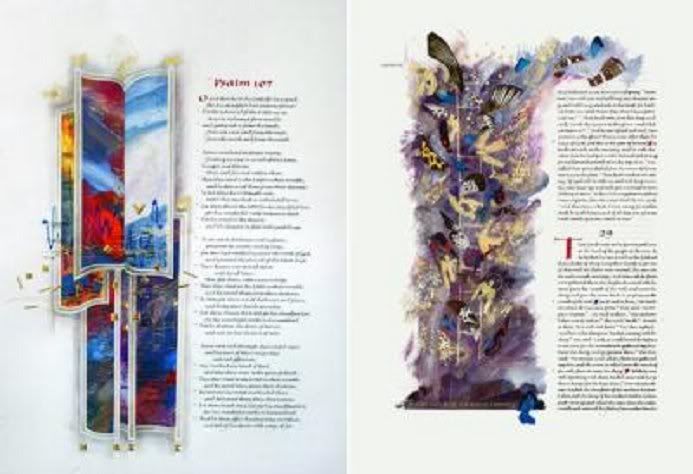
On April 4, Pope Benedict XVI will receive a fine art reproduction of the St. John's Bible, St. John's University in New York said today.
It is also called the St. Peter Apostles edition and is one of 12 sets of the edition being created.
The St. John's Bible project began in April 1998. It is the first handwritten and illuminated Bible commissioned by a Benedictine monastery in five centuries.
The Papal Foundation will present the Bible to the Pontiff. The special edition will include a handwritten dedication page by Donald Jackson, the Wales calligrapher who is the project's artistic director.
|
 26/03/2008 13:27 26/03/2008 13:27 |
|
| | | OFFLINE | | Post: 12.582 | Registrato il: 28/08/2005
| Utente Gold | |
|
  Vatican says Pope's
Vatican says Pope's
baptism of a Muslim
was not a hostile act
By Phil Stewart
[I posted a translation of the OR editorial referred to here - entitled 'Religious freedom and dialog' - last night, so it's a few posts above on this thread.]
VATICAN CITY, Mar. 25 (Reuters) - Pope Benedict's baptism of an Italian Muslim over Easter weekend was not a hostile act against Islam, the Vatican's newspaper wrote on Tuesday after the public conversion prompted criticism in the Muslim world.
In a surprise move, the Pope baptized Egyptian-born Magdi Allam, a well-known journalist and outspoken critic of radical Islamism, at an Easter Vigil service in St Peter's Basilica on Saturday evening that was broadcast around the globe.
Muslim commentators said Allam's hostile writings and his headline-grabbing baptism strained relations between Muslims and the Catholic Church and cast shadows over a recently agreed dialogue between Catholicism and Islam.
The Vatican newspaper L'Osservatore Romano, apparently reacting to this criticism, wrote a front-page editorial arguing that Benedict's gesture was an expression of religious freedom and certainly not directed against Islam.
"There is no hostile intention toward such an important religion as Islam," editor-in-chief Gian Maria Vian wrote on Tuesday. "For many decades now, the Catholic Church has shown its willingness to engage and dialogue with the Muslim world, despite thousands of difficulties and obstacles."
But critics of the baptism questioned why the Pope chose to highlight the conversion of Allam, known in Italy for his attacks on Islam. Church experts on Islam privately expressed concern that his message could strain inter-faith relations.
Writing in Sunday's edition of the Milan daily Corriere della Sera, of which he is a deputy director, Allam said: "... the root of evil is innate in an Islam that is physiologically violent and historically conflictual."
Catholic-Muslim relations nosedived in 2006 after Benedict delivered a lecture in Regensburg, Germany, that implied he thought Islam was violent and irrational.
Muslims around the world protested and the Pope, who said he did not agree with the Byzantine emperor he had quoted, sought to make amends by visiting the famous Blue Mosque in Istanbul and praying towards Mecca with its imam. [What a hateful, unworthy and totally gratuitous motivation to attribute to a Pope! It trivializes the tremendous personal and spiritual significance of an act that was so obviously spontaneous to anyone who watched that scene unfold on worldwide television!]
Earlier in March, the Vatican agreed with Muslim leaders to establish a permanent, official dialogue to improve relations.
L'Osservatore Romano said the Vatican remained dedicated toward dialogue with Islam: "Difficulties and obstacles should not overshadow what there is in common and how much can come of the future."
Aref Ali Nayed, a key figure in a group of over 200 Muslim scholars that launched the dialogue with the Vatican and other Christian churches, said on Monday the Vatican had turned the baptism into "a triumphalist tool for scoring points."
"The whole spectacle... provokes genuine questions about the motives, intentions and plans of some of the Pope's advisers on Islam," Nayed, who is director of the Royal Islamic Strategic Studies Centre in Amman, said in a statement.
[Nayed, of course, is being disingenuous. He should know full well that this Pope makes decisions after appropriate consideration for the possible consequences of what he says or does (as well as the guidance of the Holy Spirit, which, of course, is not a factor considered at all by non-Christians), and does not depend on what 'advisers' tell him, even though, from all accounts, he listens to everyone who offers an opinion to him. Mayed uses the euphemism 'the Pope's advisers' - instead of directly attributing questionable 'motives, intentions and plans' to the Pope - to avoid being seen as attacking the Pope directly. It's all part of an intellectual dishonesty that wants to have its cake and eat it, too, e.g., "Oh, I'm very indignant as a Muslim, this baptism was a disgrace and an insult, but hey, I am high-minded. See, I am not attacking the Pope himself!"]
====================================================================
I obviously cannot cope with translating the flood of pertinent and powerful commentary in the Italian media in defense of this 'public baptism' - not to mention the even greater flood of hostile or prudency-counselling reactions even from some Catholic intellectuals, including - surprise! - Vittorio Messori. I will post what I can.
======================================================================
Muslim journalist's conversion
stuns Europe, Islamic world
Rome, Mar. 25, 2008 (CWNews.com) - The conversion of a prominent Egyptian-born journalist, who was baptized by Pope Benedict XVI at the Easter Vigil, has stirred strong reactions across the Islamic world.
Magdi Allam, a deputy editor of the Italian daily Corriere della Sera, said that his reception into the Catholic Church marked "the most beautiful day of my life." But his embrace of the Catholic faith outraged many Muslim leaders. Islam teaches that apostasy is punishable by death.
Allam had already been a target of Muslim anger because of his outspoken criticism of Islamic extremism. He lived in seclusion in Italy, accompanied by bodyguards during his public appearances, even before his conversion.
"I know what I am facing," Allam said after his Easter baptism. Recognizing that he was taking personal risks, he said, that he did so "with the certainty of faith." He added that he drew strength and courage from the example set by Pope Benedict, who chose to baptize him personally despite the inevitable fallout.
The Easter-vigil baptism, Allam said, sent a unmistakable message from Pope Benedict to the entire world, and especially "to a Church that has recently been overly careful about the question of converting Muslims."
Christians, he said, should overcome their fear of reprisals and preach the Gospel boldly, even in Islamic countries, confidently leaving the results in God's hands.
While militant Islamic leaders condemned Allam for forsaking the Muslim faith, other voices offered more measured criticism. Arif Ali Nayed, a member of the Muslim group sponsoring the "Common Word" initiative, said that the Vatican was exploiting the conversion as "a triumphalist tool for scoring points." He promised, however, that the Common Word group would persevere with plans for talks with the Vatican.
Allam is the most prominent Muslim in Europe to embrace the faith in recent years.
Ibrahim Rugova, the leader of Kosovo's independence movement, was the subject of reports that he had converted to the Catholic faith before his death. But Cardinal Angelo Scola of Venice, who held long private meetings with Rugova before the Kosovar leader's death in 2006, has never confirmed those reports.
The conversion of Rugova, if it did indeed take place, could have had an enormous impact in Kosovo, a region of explosive religious tensions.
=====================================================================
I have not gotten around to translating the first statement Aref Ali Nayed released to the media accusing the Vatican of exploiting Magdi Allam's conversion as a 'triumphalist tool for scoring points' and other aspersions, quoted in the wire agency reports I have posted so far.
Now comes an interview he gave to Spain's EL PAIS newspaper, which has made it available in English translation today on their international online edition. I am not happy about having to 'sully' this thread with propaganda like this, but it's news, unpleasant as it is.
Already, the quotation that the newspaper chose to make its headline for the article made me gag - and worse! These liberal anti-clericals will use any pretext to paint the Pope black!
Speaking of authentic provocations, the anti-Allam, anti-Church campaign Nayed is now waging is an obvious provocation intended to arouse similar indignation in the rest of the Muslim world.
And have Naref and any of his colleagues in A COMMON WORD ever called the daily killings by Muslims in Iraq - which target victims at random, most of them feelow Muslims - a 'provocation' to any right-minded person of good will anywhere????? Has any of them ever denounced the Iraq killings and the suicide bombers?
So, for what it's worth, here's the sanctimonious, acrimonious Mr. Nayed, about whom I am frankly uncharitable because I think he is an opportunistic exploiter and is by no means the objective 'scholar' he makes himself out to be. This is a hateful, spiteful interview!
And Nayed is too partisan - mostly in a self-serving way - to continue playing a major role in the Catholic-Muslim Forum, as he does not seem to be aware of the responsibility that comes with it to guard against false grievances at the slightest pretext!
'Our ailing world did not need
another provocation'
by IGNACIO CEMBRERO
EL PAIS, 26/03/2008
Aref Ali Nayed holds an official post, that of director of the Royal Institute of Strategic Studies of Islam in Amman, but in recent months he has been the spokesman for some 200 Muslim scholars who have initiated a dialogue with the Christian community, having signed the manifesto “A Common Word”, in which they seek to highlight common values.
At the start of this year he was in the Vatican and he plans to return there in the next six months to meet with Pope Benedict XVI. Nonetheless, he still rails against the Pope for having “provoked” Muslims by baptizing at Easter the Egyptian journalist Magdi Allam, a well-known critic of Islam.
Do you think the Pope should not have baptized the Egyptian journalist Magdi Allam last week? Is that, in your opinion, a kind of provocation?
There is no problem in Allam being baptized; he seems to have been a tacit Catholic all his life as a result of his Catholic schooling, and it is his decision before God. There is no problem in the Pope baptizing because that is part of what Popes do.
There is, however, a problem with the Pope personally and spectacularly baptizing an infamous anti-Islam journalist who, on the very same day, revives the anti-Islam discourse of Regensburg.
[Who decides who is infamous, Mr. Nayed? Christianity is not about that. And there you go, calling Regensburg an 'anti-Islam discourse', which it was not and was never meant to be, because Islam was not the topic!]
Do you think the Pope was badly advised?
Yes, indeed. Many moderate and sincere Muslims and Catholics have worked very hard to mend the massive damage caused by the Pope’s Regensburg Lecture [September 2006]. Just recently we have been able to achieve, together, the establishment of a permanent Catholic-Muslim Forum.
[And would that ever have happened if the Pope had not thrown out a challenge to everyone in Regensburg about the inseparability of faith and reason even in the eyes of God?]
Our ailing world, suffering from an abundance of conflicts, did not need another provocation.
[Certainly not your kind of provocation - manufacturing a crisis where there should be none - which this very interview and all your statements on the Allam conversion have been!]
How is the Moslem world reacting to that?
There are scholars who feel that the whole case should just be ignored. [Oh that we could hear from them instead!] There has been an annoying recent tendency to try to repeatedly provoke Muslims. [Certainly not by the Pope or the Church!] When we give these provocations attention we are satisfying the provocateurs.
There are others who blame us for pursuing Catholic-Muslim dialogue because they think that the present Vatican attitude [What 'present Vatican attitude'?] is not conducive to dialogue.
There are others, and I am amongst them, who feel that we must continue dialogue no matter how provoked we are. Dialogue is a religious duty that must be pursued for the sake of all humanity and of world peace. [Hear, hear! "I'm the good guy, you see? It's the Pope and the Vatican who are not doing their part!"]]
Are there some resemblances between the Easter baptism and the allocution of Regensburg?
A. Yes, the triumphalist choreography, and the contents of Allam’s baptism article in the Corriere della Sera are identical with the content and spirit of the Regensburg Lecture. That is the main problem with the whole episode.
[There you have it! For all his prolix hymns to dialog any chance he gets, that is really how Nayed sees the Regensburg lecture - as if there would ever have been A COMMON WORD if Regensburg had not challenged their smug assumptions!
And what 'triumphalist choreography' is he talking about? Regensburg was a simple academic lecture held without undue hooplah, except that it happened to take place during a Papal Visit to the Pope's homeland.
Nayed, who purported to answer the entire lecture comprehensively and 'in a scholarly manner' back in 2006 now seems to reduce it - like every critic has done - to nothing but the quotation from Manuel II Paleologue that there is an inherent violence in the teaching of Islam - which is, in effect, what Allam says in his letter to Corriere].
From time to time we also see leading Christian intellectuals converting to Islam. Could Christians also become angry?
I think that if a Muslim authority picked out a converting vehemently anti-Christian author and exhibited him on television in a major ceremony, and published a hateful anti-Christian article by him,[Who published Allam's article? Corriere della Sera certainly does not represent the Church - it is so often anti-Church!] many Christians would indeed be angry. [You are self-projecting, Mr. Nayed, your own touchy paranoid attitude on Christians!]
People are converting both ways all the time. The issue was not the conversion, but rather the way it was instrumentalized by the Vatican.
[Excuse me, who is instrumentalizing what? The entire Easter Vigil liturgy and baptisms would have been telecast worldwide - as it has been for decades since the advent of satellite TV - regardless of who was being baptized!
Nor did the Church invent the Easter Vigil liturgy overnight to celebrate Allam's conversion! That liturgy has been there for centuries to celebrate - in the most solemn and glorious, and yes, triumphal, manner possible - the central event of Chrsitianity!]
Do you think the conversion of Magdi Allam is special because he is a fierce critic of radical Islam and a defender of Israel? Was Allam influenced by Catholic schools he attended as a child?
No, it was special because of his hateful anti-Islam discourses. The problem is not his anti-radicalism; most of our scholars are also anti-radicalism. The problem is that he is vehemently and hatefully anti-Islam.
[Which is flatly wrong and unfair. Allam has always qualified his objection as being against radical, extreme Islamism and terrorism. And for him to now express the opinion that at the root of such extremism is something inherently violent in Islam's teachings is his interpretation of actual statements in the Koran and of historical fact that many others, like Manuel II Paleiologue, have shared through the centuries.]
Allam says that he took communion as a child. He seems to have been Christianized at school at an early age. [So? Doesn't the fact that he was never a practising Muslim explain his detached evaluation of it?]
Mustapha Krim, the president of the Protestant Church of Algeria, reported yesterday that 13 temples have been close mainly in Kabylia by the Algerian authorities. The apostolic nuncio in the Gulf, archbishop Mounged El-Hachem, has not reached until now an agreement with Saudi Arabia in order to be allowed to open churches in this country. Could the Christians aspire to reciprocity?
Reciprocity is an important diplomatic notion. However, the ethics and conduct of followers of heavenly religions should be based on the unhesitating praxis of pure compassion, without regard to how others treat them.
[Such mealy-mouthed sanctimony! Ignoring the fact that this is exactly what Christians are doing these days despite the worst provocations! In what Christian country in the world have Muslims been prevented from exercising their religious freedom?]
Only Algeria can address the Algerian cases. They best know their country, its circumstances, and its history. I am sure that the dark and bloody pages of the alliance between Colonialism and Catholicism in Algeria have a lot to do with Algerian attitudes. [Please! It has to do with an Algerian crackdown law passed only two years ago! Rather late to retaliate for supposed colonial wrongs!]
As for Saudi Arabia, the Vatican is now engaged with the Royal House itself, and such issues can be discussed between them.
It is often forgotten, however, that the Vatican never granted mosques when it was in power [In power where? In Italy? The Popes held temporal power until 1861, but there was hardly any demand for mosques in Italy in 1861, and certainly, not in the Papal states, where they exercised that power!]
...and is unlikely to grant a mosque in Vatican City.
[Of course, it is most unlikely, because by definition, Vatican City State is the seat of the Roman Catholic Church, and its citizens are limited to the Vatican-based church hierarchy, including the Pope, and those employed at the Vatican! Is this supposed 'scholar' thinking at all before indulging in all this unrestrained illogical logorrhea????]
As a matter of fact, it always resisted mosque building until the Italian secular state granted such rights in very recent times.
[Is that historically true? Did the Church ever object to synagogues in Italy, for instance, which were there before Christian churches were? Besides, Nayed conveniently forgets that the question of mosque-building in Italy is a fairly recent development that came with large-scale Muslim immigration to Italy starting in the 1980s - and that even before the Lateran Pacts revoked Catholicism as the state religion of Italy, the Vatican since 1861 has had no say over what can and cannot be built on Italian territory!
I don't believe there is a national policy anywhere against building mosques. In the democratic countries, it is entirely a question of local zoning laws and the attitude of the immediate community and neighborhood affected by the mosque building.]
When invoking ‘reciprocity’ one must not self-righteously claim the good deeds granted by others as deeds of one’s own.
[Come again? Has the Vatican ever claimed the building of mosques in Italy as 'deeds of one's own'? What it has said and is saying is that the Christian nations of the world in modern times have respected religious freedom, including the freedom of any faith to build houses of worship. The reciprocity it requests is that Muslim countries do the same for Christians and other non-Muslim minorities.]
We have seen last week Osama Bin Laden attacking king Abdallah because he travelled to the Vatican last year to meet the Pope. Are radical Moslems obstructing religious freedom in the Arab world? Are they preventing Governments from making concessions to Christian religions?
I do not think that radicals determine what Muslim governments do. However, the multiple attacks on Muslim countries and peoples
[What multiple attacks on Muslims, where, by whom?????] are often cited in critiques of any positive moves towards the West by any Muslim government.
I am sure that the ending of wars and and the bringing about of peace can help improve Muslim-Christian relations on all fronts.
Do you consider the cartoons of the Prophet an expression of (large) widespread and popular anti-Islamic feeling in Europe and in the West?
I would not say ‘a large popular feeling’, but a loud minority element in the complex composition of the West.
[A loud minority element? One newspaper in one of Europe's smallest countries printed the cartoons. Most right-thinking elements in the West are of the opinion that it was not wise to cause such a provocation by targeting the founder of a major religious faith. Other Western newspapers reproduced the cartoons to report them as news, consistent with their liberal bias regarding freedom of expression. Such editorial decisions may be disputable as a matter of judgment and personal conscience, but not as a matter of their right to report legitimate news.]
Europe has always had a minority of demonic and dark forces. [Not just Europe. 'Demonic and dark forces' are everywhere, the Muslim world not excepted!]
Such forces focused their hate on our Jewish brothers and sisters in the past, with horrific and tragic results. These forces are now focusing their hateful vehemence on Islam and Muslims.
[Is he saying the 'forces' of anti-Semitism are the same forces now against Islam? Anyone else who thinks that, raise your hand! And what about the hateful vehemence that radical Islamists are focusing on everyone else - in dramatic widespread incidents that have so darkened the history of the world in the past few decades, since the radicals started to use terrorism as an all-purpose tool for their ends????]
I pray that Europe will have the wisdom to see that such forces for what they are. Such forces can change the object of their hate, but are still essentially the same forces that lead to the darkest chapter in Europe’s history.
[And what about the dark chapters still being writ in the history of Islam, because of unchecked terrorism by extremists who use their religion to justify their blood lust?]
We must not let these forces hide behind appeals to freedom of expression, a freedom that we all uphold.
Are you nevertheless continuing the dialogue with Christians? Are you going to hold a formal meeting in November in Rome? Would it be now more difficult?
Our dialogue with the People of the Book (Christian and Jewish) is a theological and spiritual imperative. The Prophet of Islam (peace be upon him) asks us to connect even with those who cut us off, to give to even those who deprive us, and to forgive even those who are unjust towards us. We will continue dialogue no matter what.
Furthermore, our dialogue is not limited to Catholics. We are in very productive dialogue with Evangelicals, Anglicans, Orthodox and a host of other denominations. [Really now? have we read about any of it at all?]
As for the November meeting, I do pray that it will still go forward. We need to be engaged in order to resolve crises. It would help, however, if we all refrain from creating further ones.
AAAAARGHHHHHH!!!! What can be more insupportable and revolting than sanctimony plus paranoia plus blatant publicity-seeking , egoism and downright lying - all in one person who is getting the run of the media????
If EL PAIS published this interview without at least a short comment to rebut the patent lies and misrepresentations that Nayed cites self-righteously all over the place, then they are guilty of criminal irresponsibility to their readers!
[Modificato da TERESA BENEDETTA 26/03/2008 17:56] |
 26/03/2008 14:26 26/03/2008 14:26 |
|
| | | OFFLINE | | Post: 12.583 | Registrato il: 28/08/2005
| Utente Gold | |
|
GENERAL AUDIENCE TODAY
A full translation of the Holy Father's catechesis today has been posted in AUDIENCE AND ANGELUS TEXTS.
The Holy Father held his Wednesday General Audience today in St. Peter's Square, flying in by helicopter from Castel Gandolfo, where he is staying during the Easter Octave. It was the first GA held outdoors since the venue shifted to Aula Paolo VI at the start of winter last year.
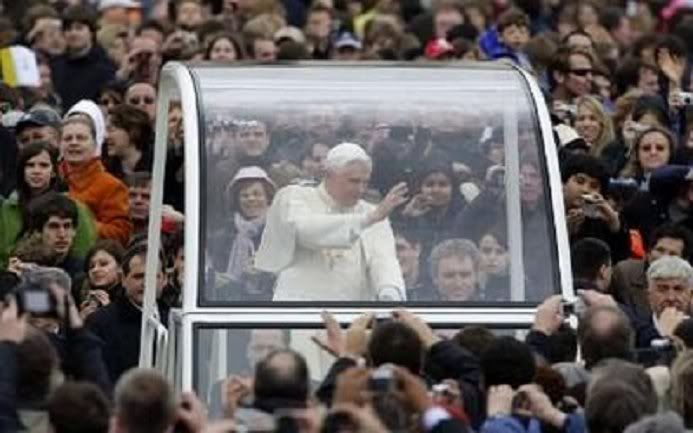
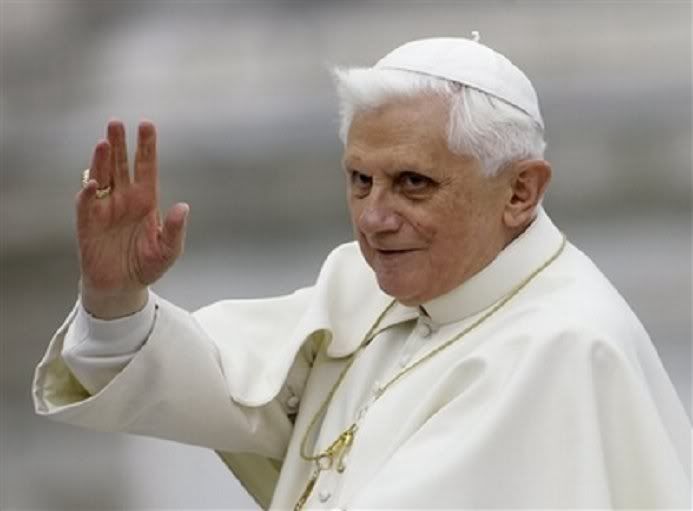
His catechesis today was about the significance of Easter. After the audience, the Pope flew back to Castel Gandolfo.
Here is how he synthesized his catechesis in English:
Christ is risen! The mystery of Jesus’ resurrection from the dead stands at the heart of the Christian faith.
Throughout this Easter season, the Church contemplates the infinite richness of this mystery and strives to live the new life brought to us by the Risen Lord. Christ’s resurrection is also our resurrection; in his Passover from death to life, Jesus has assured us of our salvation.
The Church’s joyful proclamation that Christ is risen has the power to change lives and to shed new light upon human history. Today, as in every age, Christ comes to meet us and to remain in our midst with his saving power.
During these days of the Octave of Easter, the Liturgy invites us to reaffirm our faith in the Risen Lord, to hope more firmly in his promises, and, like the disciples on the way to Emmaus, to recognize him in the breaking of the bread (cf. Lk 24:31).
In the Eucharist, the living memorial of Christ’s sacrifice and the celebration of his real presence, we truly encounter the Risen Jesus in his word and in the sacrament of his body and blood.
Through the prayers of the Virgin Mary, may the joy of this Easter make us faithful messengers of the light and hope of the resurrection. Happy Easter to you and your families!
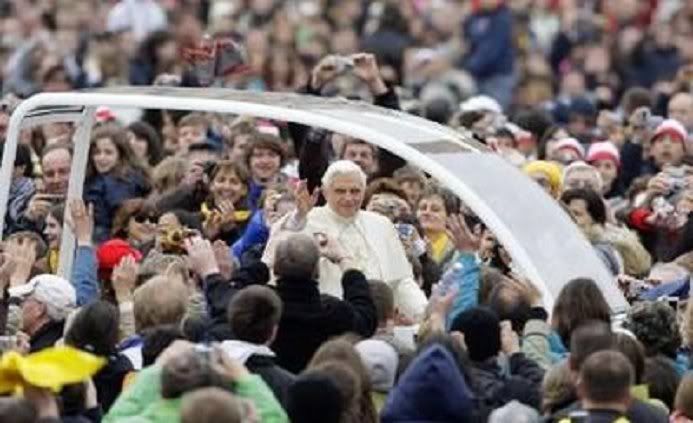
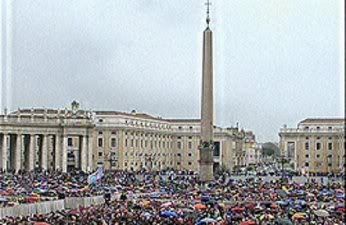 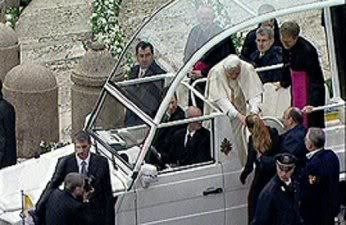
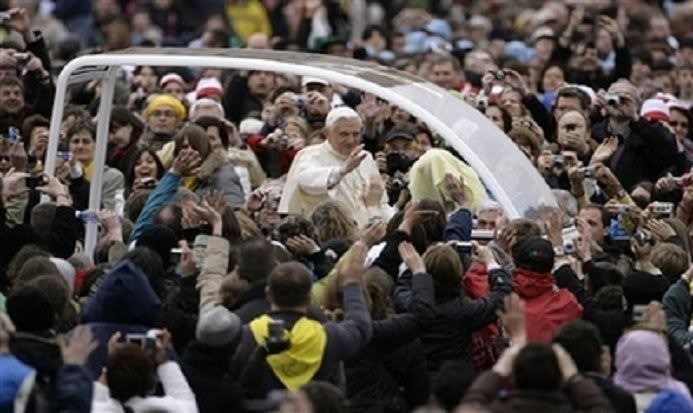
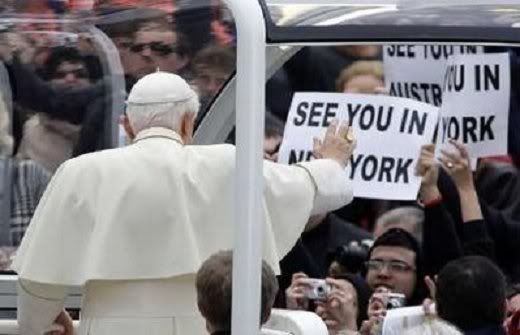 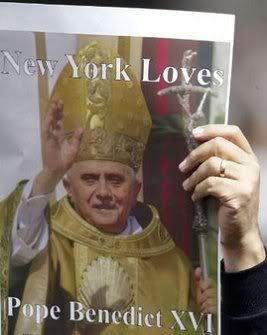
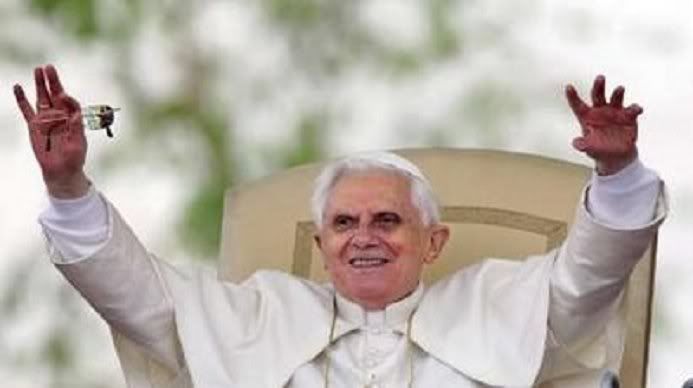
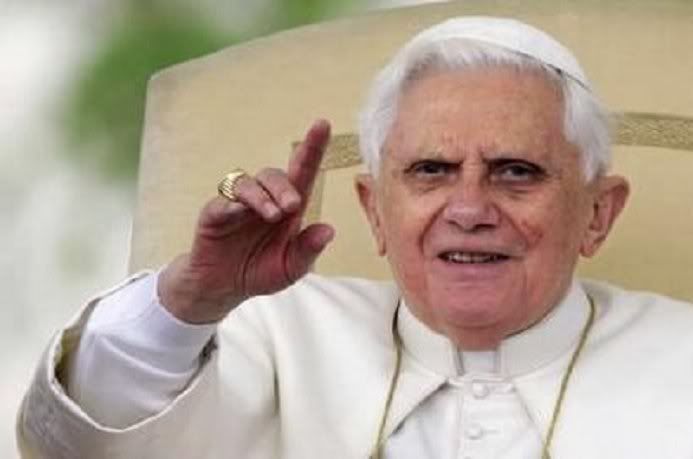
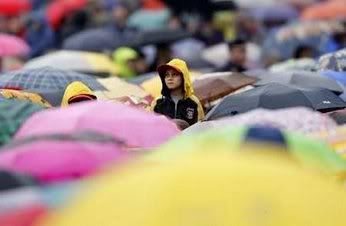 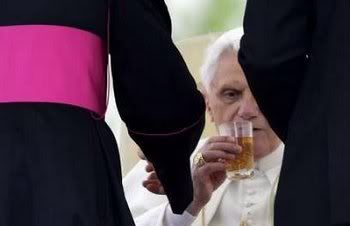
[Modificato da TERESA BENEDETTA 26/03/2008 20:12] |
 26/03/2008 18:17 26/03/2008 18:17 |
|
| | | OFFLINE | | Post: 12.584 | Registrato il: 28/08/2005
| Utente Gold | |
|
    Interview With Mary Ann Glendon,
Interview With Mary Ann Glendon,
United States Ambassador to the Holy See
From the English service of

(26 Mar 08 - RV) The United States Ambassador to the Holy See, Mary Ann Glendon, presented her credentials to Pope Benedict on February 29th of this year.
Prior to her appointment, Ambassador Glendon was the Learned Hand Professor of Law at Harvard University in Cambridge, Massachusetts. In 1995, Pope John Paul II appointed her head of the Vatican delegation to the U.N. Conference on Women in Beijing. In March 2004, the same Pope named her President of the Pontifical Academy of Social Sciences.
In addition to teaching at Harvard, she has been a visiting professor at the Pontifical Gregorian University and the Regina Apostolorum Athenaeum, both here in Rome.
She sat down with Charles Collins for an interview, discussing her work, Pope Benedict's upcoming trip to the United States, and her plans on marking the 25th anniversary of the establishment of diplomatic relations between the United States and the Holy See....
HERE ARE SOME EXCERPTS FROM THE INTERVIEW.
CHARLES COLLINS: YOU ARE VERY FAMILIAR WITH ROME, AND HAVE SERVED ON THE OTHER SIDE OF THE TABLE, AS IT WERE, REPRESENTING THE HOLY SEE IN VARIOUS CAPACITIES. WHAT EFFECT DOES THAT HAVE ON YOUR PRESENT POSITION?
Most of the work that I did for the Holy See over the past several years has been as an academic, as a person whose scholarly work and research was concentrated in fields that are central to the common concerns of the United States and the Holy See, human rights in particular, so the big transition for me is really from chiefly academic work to a more public and political role.
CC: YOU HAVE STARTED YOUR JOB, WELL YOU HAVE A RUNNING START BECAUSE NEXT MONTH THE POPE WILL BE VISITING THE UNITED STATES. HOW ARE THE PREPARATIONS GOING IN THE UNITED STATES FOR THIS VISIT?
The planning for the visit is largely in the hands of the Holy See on this end, and the American Catholic Bishops on the other end, and as far as I can see the preparations are well in place and there is a good deal of anticipation on both sides of the Atlantic about the visit.
CC: ON A POLITICAL LEVEL, THE POPE WILL BE MEETING WITH PRESIDENT BUSH IN THE WHITE HOUSE. CAN YOU TELL US MORE ABOUT THIS ENCOUNTER?
The announcement from the White House is interesting. It is a very short announcement, but the wording is significant. It says that the Pope and the President will continue the discussions that they have been having about the role of faith and reason in advancing their shared goals.
I think that is significant, because that word “continue” relates to the fact that apparently the last time they met they developed a personal relationship: They hit it off, so to speak. They both said afterward that they had enjoyed the conversation and the companionship of the other, so I think they have something to build on.
And it is interesting that the announcement picked up the theme of faith and reason, which is so central to this pontificate. And then when the announcement went on to speak of the shared goals, it spoke of the common interest in promoting tolerance and understanding among cultures and religions. It spoke of promoting peace in the Middle East and other troubled regions. It spoke of promoting human rights and especially religious freedom.
CC: WE JUST MARKED THE FIVE-YEAR ANNIVERSARY OF THE U.S. LED INVASION OF IRAQ. THE HOLY FATHER HAS BEEN CALLING ATTENTION TO THE PLIGHT OF CHRISTIANS AND OTHER RELIGIOUS MINORITIES IN IRAQ. LAST MONTH, THE ARCHBISHOP OF MOSUL, PAUL FARAJ RAHHO WAS MURDERED, THE LATEST IN A SERIES OF ATTACKS ON THE CHRISTIAN COMMUNITY. WHAT IS THE UNITED STATES DOING TO HELP PROTECT RELIGIOUS MINORITIES IN THE COUNTRY?
As you know, both the President and the Holy Father issued statements after the murder of the Archbishop, statements that are very much in the same vein, condemning the violence, condemning terrorism, and especially condemning religion as a pretext for terrorism.
And of course both the Holy See and the United States have as a central concern the plight of Christians and other minorities in Iraq. They have both pledged to do what they can, but it is a very difficult situation when there are elements in society that are determined to defeat the common aim of the United States and the Holy See.
Now, after some initial disagreement there is a common aim to promote the building of a free and democratic and stable society where persons of all religious faiths will be protected, but it is an uphill battle all the way. I think we are making some progress, but it is very, very difficult.
[Modificato da TERESA BENEDETTA 26/03/2008 18:22] |
 27/03/2008 12:58 27/03/2008 12:58 |
|
| | | OFFLINE | | Post: 12.591 | Registrato il: 28/08/2005
| Utente Gold | |
|
    How the Pope might influence
How the Pope might influence
the US presidential election
BY ELIZABETH BIRGE
Star-Ledger (NJ)
March 27, 2008
Pope Benedict XVI arrives for his first visit in the United States next month with the country once again in the middle of a heated presidential election.
And while no one believes the Pope will speak directly about the presidential election during his visit, the tone and focus of his speeches could help influence millions of Catholic voters, many of whom live in key swing states such as Ohio, New Jersey and Pennsylvania, which holds its primary next month.
If Benedict speaks pointedly about abortion, it could give a lift to Republican Sen. John McCain, even though McCain is at odds with the church on one key issue: embryonic stem cell research.
"John Paul II made it quite clear that the litmus test for Catholic orthodoxy was abortion, with sexuality not being far behind," said Mary E. Hunt, of the Women's Alliance for Theology, Ethics and Ritual. "But I'm not sure how Cardinal Ratzinger/Benedict will go on about that in the public arena in the states, whereas John Paul II had no compunction about bringing it up. He put it front and center like red meat."
But if Benedict also focuses more on world peace, poverty and church positions against capital punishment and punitive immigration laws, then many Catholics may consider supporting whichever Democrat gets the nomination, experts say.
If Sen. Barack Obama or Sen. Hillary Clinton can make even small inroads among the deeply religious Catholics who have voted Republican in recent elections, they could improve their chances of winning key swing states.
Theologians agree this election will be less rancorous among Catholics than in 2004 because there is no Catholic candidate and because the debate over gay marriage is now being held at the state level rather than national, as it was in 2004.
During the 2004 presidential election, the U.S. Conference of Catholic Bishops debated at great length whether a pro-abortion Catholic politician -- such as Democratic presidential candidate Sen. John Kerry, although the bishops never mentioned him by name -- should be denied Communion.
In the end the bishops put the responsibility on the candidates, saying if a Catholic lawmaker knew he was out of step with fundamental church teaching on issues of life, he should stay away from the altar.
Also expected to be missing this year will be heated national discussion on same-sex marriage laws. A constitutional amendment to ban same-sex marriage supported by the Bush administration -- and the Catholic Church -- was defeated in the U.S. Senate in 2006. McCain voted against the amendment which would have banned same-sex marriages.
Thus what Catholic voters may struggle to find come November, is a clear political home. Of the three candidates, none is perfect fit for Catholics hoping to elect a president sensitive to all their issues.
To help Catholics sort out their responsibilities both as citizens and members of the church, the U.S. Conference of Catholic Bishops periodically publishes a document called "Forming Consciousness for Faithful Citizenship." But depending on who you are, or how you read the most recent issue, published last fall, the advice can be confusing.
Abortion is considered an "intrinsic evil" by the church, meaning the action is a moral evil and against the will of god. Euthanasia, cloning, legalizing same-sex marriage and embryonic stem cell research are also considered intrinsic evils.
Some Catholic theologians hold that if a political candidate supports such an "intrinsic evil," Catholics simply cannot vote for him or her because it is the sanctity of human life from which all issues flow.
Clinton and Obama support abortion rights and embryonic stem cell research. And although McCain supports embryonic stem cell research, he agrees with church on abortion and same-sex marriage, despite his vote against the federal amendment.
"The issue for Catholics is whether they agree with the teachings of the church on the question of the killing of innocent life," said the Rev. Richard Neuhaus, the editor of First Things, a journal of religion, culture and public life. "The protection of life takes priority over a whole range of issues that reasonable people can disagree about."
The Faithful Citizenship document, however, states that if a candidate opposes an intrinsic evil, but is indifferent to other important church issues -- such as capital punishment, reducing poverty, ending the war in Iraq -- a Catholic voter could support another candidate for what are called "morally grave reasons" and not compromise him or herself in the eyes of the church.
"In other words," said the Rev. Thomas Reese, a senior fellow at Woodstock Theological Center at Georgetown University, "you've got a pro-choice candidate running for office and (a voter says), 'I think there are morally compelling reasons why I should vote for this candidate' because, for example, this candidate is in favor of health care for children and treatment for pregnant women. That would be a compelling reason."
But don't look for the bishops as a group to tell Catholics specifically how to vote. A November press release from the United States Council on Bishops on the Faithful Citizenship document specifically noted that the group was not trying to instruct its members -- who accounted for 25 percent of actual voters in the 2004 presidential election -- what to do in the polling booth.
"What the church does want," says the Rev. Drew Christiansen, editor of America magazine, "is for its members to think. "
"You have to have a well-informed conscience and know the church's teaching on all these choices and make a conscience decision on who will best serve the country and the church," said Christiansen.
The bishops conference doesn't favor one political party over the other, said Reese, and has never been happy with either group's platforms.
"They're not happy with pro-choice Democrats, although if you go through (the Faithful Citizenship) document when they start giving examples of what the government should do, overwhelming the bishops on public policy are to the left of liberal Democrats," said Reese. "So only three things in the Faithful Citizenship document would be close to Republican positions: abortion, gay marriage and aid to Catholic schools."
Two days after the 2004 presidential election William Portier ran into an acquaintance at the grocery store.
The man was a strong opponent of the Iraq war and had demonstrated against it, but when it came time to vote, he chose not to.
"He said he couldn't vote for (George) Bush because of the war, and he couldn't vote for (John) Kerry because of his support for abortion," said Portier, a distinguished professor of religious studies and chair in Catholic theology at the University of Dayton in Ohio. [NB: But this is the professor who said Pope Benedict has been silent about the question of sexual abuses by priests! See story in the US visit thread.]
What the fall election will be more about is "can good Catholics vote for Clinton or Obama and it seems to me they can," said Portier of the University of Dayton.
"This is a great opportunity for one or both of them to kind of make a move in the direction of Catholic Democrats in Pennsylvania by departing or nuancing the Roe v. Wade orthodoxy," he said, referring to the U.S. Supreme Court decision that legalized abortion in 1973.
Clinton, he said, has sort of inherited her husband's "safe, legal and rare," position, referring to former President Bill Clinton's policy on abortion.
"She could say more, like, '(Abortion is) a moral question for a lot of people, but we don't have a majority consensus on what the law should be,' and admit that it's more complex," he said.
As for Obama, "I think (he's) also in a good position to do that. Catholics are going to vote for who they're going to vote for, but there are a whole lot of people for whom abortion and stem cells are very important issues, and if a Democratic candidate made a gesture and recognized there are these concerns, they might have a better shot in places like Pennsylvania."
Americans looking for direction on Benedict's public policy priorities may find clues when he addresses the United Nations.
Reese said he believes Benedict will talk about a host of issues important to the church and not just focus on abortion and sexuality.'
"His political agenda is big and expansive and very much focused on issues of peace, justice and human rights, and within human rights, he sees the right to life being the pre-eminent human right," said Reese. "To paint him as a one-issue person is to close your eyes to all the issues that he's concerned about."
Here's a much earlier story I missed from CNS - an excellent report about Benedict's Magisterium, based on his homily on Palm Sunday:
Pope will probably address
provocative, fundamental themes
during US visit
By John Thavis
Catholic News Service

VATICAN CITY, March 20 (CNS) -- People speculating on what Pope Benedict XVI will say in the United States in April would do well to look at what he said at the Vatican on Palm Sunday.
In a sermon that lasted less than 15 minutes, the Pope touched on several important themes of his pontificate -- themes that are likely to form the core of his pastoral message in the United States.
Naturally, the Pope will tailor his U.S. talks to specific audiences, including educators, priests and seminarians, young people and bishops.
But rather than a laundry list of specific problems and solutions, his listeners in Washington and New York are apt to hear carefully reasoned arguments about the foundational values of Christianity.
On Palm Sunday, the Pope posed a blunt question, one that caught people's attention: "Is our faith pure and open enough?"
More questions quickly followed: Is the faith of today's Christians pure enough to attract other spiritual seekers? Do modern Christians recognize that "greed is idolatry," and is this awareness reflected in their lifestyles? Are Christians willing to let their own lives be radically shaped by Christ?
The Pope's words echoed a famous Good Friday meditation he wrote in 2005, a few weeks before his election, when he acknowledged the failings of Christians and characterized the church as a boat "taking in water on every side."
This call to self-examination in light of the Gospel is high on the pope's pastoral agenda. It's not about "Catholic identity" imposed from the outside, and it's not about following rules; it's about provoking people to reflect on what it means to follow Christ.
That led to the second point in his Palm Sunday sermon: that Jesus must be correctly understood by Christians today.
"He does not come as a destroyer. He does not come with the sword of a revolutionary. He comes with the gift of healing," the pope said.
"He dedicates himself to those who because of their frailty are pushed to extreme situations in their own lives and to the margins of society," he said.
The appeal to meet the real Jesus is often the center of Pope Benedict's major homilies. He wrote a book last year because he was convinced that the identity of Jesus, human and divine, was falling out of focus. Even for Christians, he wrote, "intimate friendship with Jesus, on which everything depends, is in danger of clutching at thin air."
The Pope's sermon continued to another of his hallmark themes: that Jesus reveals God as one who loves, and "his power as the power of love." It follows that healing and serving others always will be part of the proper worship of God, he said.
"God Is Love" was the title of the pope's first encyclical. No doubt many Americans have heard the phrase, but probably far fewer understand what it means.
The answer is not complex, and the Pope will no doubt enunciate it in April: that Christianity's central mission is to help people accept God's love and share it in their daily lives.
A final theme of the Palm Sunday sermon, perhaps the most urgent in the Pope's view, is the tendency for modern men and women to push God out of the picture, "as if God were our competitor."
The Pope sees this as the ultimate form of pride, one that poses real dangers in an era of scientific and technological progress.
"Isn't this precisely the logic of the modern age, of our age? Let us declare that God is dead, then we ourselves will be God," he wrote in his book, Jesus of Nazareth.
The exclusion of God from personal and social life, the Pope has argued, inevitably leads to the idea that "we ourselves are our only measure." The resulting problems, he said, already can be seen, and include widespread alienation and unhappiness, diminished respect for human life, and environmental irresponsibility.
This is the bread and butter of Pope Benedict's teaching ministry. He relies heavily and creatively on Scripture, convinced that New Testament parables and Old Testament lessons can speak to the modern human condition.
He explores the relationship between truth and freedom in terms that are designed to be provocative, because he believes the faith should prod and challenge people.
As he once said, the Church should be teaching people that it's not enough to be and think "more or less like everyone else."
And he always draws these prescriptions back to a personal relationship with Jesus Christ.
As he said during his last foreign trip, to Austria in September, Christianity is "more than and different from a moral code, from a series of requirements and laws. It is the gift of friendship that lasts through life and death."
The Pope's U.S. audiences will no doubt hear a similar exploration of the roots of the faith.
[Modificato da TERESA BENEDETTA 27/03/2008 13:34] |
 27/03/2008 14:00 27/03/2008 14:00 |
|
| | | OFFLINE | | Post: 12.598 | Registrato il: 28/08/2005
| Utente Gold | |
|
THE SACRED AND THE PROFANE
begins in Rome on the anniversary
of John Paul II's death
By the Association of Marian Helpers
STOCKBRIDGE, Mass., March 26 --The first-ever World Apostolic Congress on Mercy begins in Rome Wednesday, April 2, and continues through Sunday, April 6.
Never before has the Catholic Church conducted a congress devoted to mercy. A congress gathers people from around the world to celebrate a particular aspect of faith.
 The image of Divine Mercy based on
The image of Divine Mercy based on
a 1931 vision of St. Mary Faustina Kowalska.
Pope Benedict XVI will celebrate the opening Mass at 10:30 a.m. on April 2 in St. Peter's Square, to commemorate the thirdrd anniversary of the death Pope John Paul II. (The first Sunday after Easter has been designated Divine Mercy Sunday. John Paul II died on the eve of Divine Mercy Sunday in 2005.)
Opening talks Wednesday will be given by Cardinal Christoph Schonborn of Austria, Cardinal Camillo Ruini of Italy and Cardinal Stanislaus Dziwisz of Poland. Following these remarks, Cardinal Schonborn will lead a conference beginning at 5 p.m. Opening day activities will be conducted in St. John's Lateran Basilica.
The World Mercy Congress aims to bring mercy prominently into the daily life of every person. Delegates will include clergy, laity and people of other faiths.
Beginning next year and continuing in 2010, a series of follow-up national mercy congresses will be held in the United States, Latin America, Europe, Africa and Oceania. These will be followed by regional gatherings on those continents.
Throughout the week, the congress will feature prayer, plenary sessions, ecumenical testimonies and evangelization throughout Rome.
On Thursday, Cardinal Philippe Barbarin of France will lead a session devoted to inter-religious dialogue. Leaders from various faiths are expected to participate.
On Friday, Cardinal Francis Arinze of Africa directs a session on mercy in the liturgy. The week concludes Sunday with a 10:30 a.m. Mass in St. Peter's Basilica presided by Cardinal Schonborn.
Pope Benedict's Regina Caeli follows at noon from St. Peter's Square.
Pope John Paul II tirelessly promoted the message of God's mercy and of the call to be merciful to each other. This message is found in sacred scripture, throughout history, and in the writing of St. Faustina Kowalska. The Rome congress will explore both the spiritual and social implications of mercy.
The gathering will be covered by EWTN, the Catholic global network, and many religious and secular media.
The Marians of the Immaculate Conception -- a congregation based in the U.S. on Eden Hill, Stockbridge -- has played a major role in the planning of the congress through its service arm, the Association of Marian Helpers.
Full daily coverage of the Congress will be available at www.mercycongress.org.
Background on the Divine Mercy devotion
It started with the visions of Polish nun and canonized saint, Sister Faustina Kowalska, known as the "Apostle of Mercy", 1905-1938, who was a nun of the of the Sisters of Our Lady of Mercy, Sister Maria Faustina of the Blessed Sacrament.
Sister Faustina reported having seen Christ in Purgatory, having seen and spoken to Jesus and Mary several times. Later on, St. Faustina wrote in her diary that Jesus asked her to spread the devotion of the Mercy of God.
On February 22, 1931, the nun said Jesus appeared to her as the 'King of Divine Mercy', wearing a white garment. His right hand was raised in a sign of blessing and the other was touching the garment at the breast. From beneath the garment emanated two large rays, one red, the other white.
 
Acting upon orders she said she received from Christ, St. Faustina had a picture of this vision painted. With the help of Father Michał Sopoćko, she distributed the images at Kraków and Wilno, and people began to pray before them. St. Faustina wrote a diary, despite her limited literacy.
The diary was later published under the title Divine Mercy in My Soul: The Diary of St. Faustina. St. Faustina unsuccessfully tried to found a "Congregation which will proclaim the Mercy of God to the world, and, by its prayers, obtain it for the world", but was constantly denied leave by her convent.
In 1958, the Holy See issued a document condemning the work of an Institute of Divine Mercy that had been established to propagate the Divine Mercy message, on the grounds that Sr. Faustina’s diary suggested heretical teachings. Theologians who reviewed her diary did not take into consideration her lack of education which resulted in poor spelling and punctuation, and many unclear sentence constructions that were not orthodox formulations.
Through the intervention of Karol Wojtyła, then the Archbishop of Kraków and the future Pope John Paul II, a new investigation into the life and diary of St. Faustina was launched, and the devotion to the Divine Mercy was once again permitted.
Faustina was beatified on April 18, 1993 and canonized on April 30, 2000.
======================================================================
Islamist website attacks
Vatican baptism
Rome, 26 March (ADNKronos Intl) - An Islamist website has condemned the controversial baptism of Italian Muslim journalist Magdi Allam and questioned the strength of his previous commitment to the Muslim faith.
The site, linked to the Islamist Hamas movement in the Palestinian territories says that Allam was nominally Muslim, and that he admitted to have never practised Islam and to have never prayed in his life.
The website also blasted the Western press for saying that Allam was "a prominent Muslim", and the "truth is that he was neither Muslim nor prominent."
"The problem lies in the vindictive atmosphere surrounding the conversion ceremony, including the anti-Islamic allusions and insinuations," says the article.
Allam was also quoted in a book that he wrote titled Long Live Israel, saying that "the root of evil is innate in an Islam that is physiologically violent and historically conflictual."
The article then responded to Allam's quote and spoke of Christianity's 'conflictual history', by naming bible passages, crusades, holocausts, pogroms, inquisitions, world wars and ethnic cleansings, "committed in the name of Jesus".
"As to the issue of violence, Allam is equally ignorant of historical facts," said the article.
"Because if a religion is to be judged solely by the behaviour of its followers, then Christianity stands out as the main candidate for being the most violent religion under the sun."
The article, written by a Palestinian commentator, concludes by saying that Muslims and Christians are compatriots all over the world, and that each community must be sensitive to the sensibilities and feelings of the other.
Meanwhile yesterday, the Milanese imam Yahya Pallavicini, vice-president of the Islamic Religious Community in Italy, described Allam's baptism as an "honest intellectual mistake" that had been committed with the complicity of the Vatican.
"Our position is to proceed with dialogue but we cannot hide our great embarassment for the indelicate choice of the Pope's advisors," he told Adnkronos International (AKI).
Pallavicini agreed with Nayed in his attack on the baptism saying it put at risk the dialogue between Muslims and Christians.
=====================================================================
Pallavicini, like Aref Ali Nayed, was on the Muslim delegation representing the COMMON WORD signatories who met with a Vatican panel earlier this month and established the Catholic-Muslim Forum.
Like Aref, he chooses to attribute the Pope's decision to baptize Allam at the traditional Easter Vigil baptism of adult catechumens to his 'advisers' - obviously a 'diplomatic' ploy by both of them to avoid being seen as attacking the Pope directly, but that's what they are doing.
[Modificato da TERESA BENEDETTA 27/03/2008 14:52] |
 27/03/2008 15:08 27/03/2008 15:08 |
|
| | | OFFLINE | | Post: 12.600 | Registrato il: 28/08/2005
| Utente Gold | |
|
THE POPE'S DAY, Part 2, 3/26/08
The visits were not announced in the Vatican press bulletins for yesterday, but the Vatican released the following pictures of private audiences held by the Holy Father yesterday, apparently after the General Audience, and in the Vatican Apostolic Palace, before he flew back to Castel Gandolfo.
WITH CARDINAL AGUSTIN GARCIA-GASCO
OF VALENCIA, SPAIN:
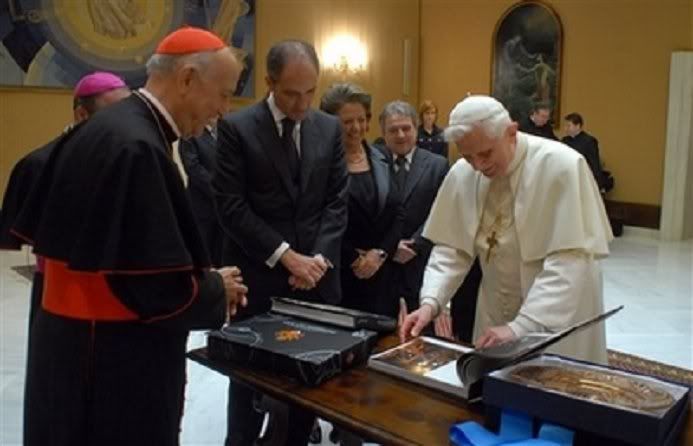 WITH THE PRESIDENT OF
WITH THE PRESIDENT OF
THE UNITED NATIONS GENERAL ASSEMBLY
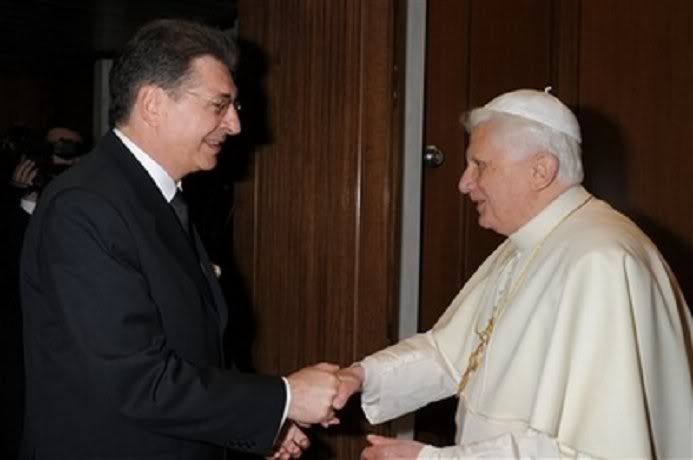
ROME, March 26 (UPI) -- A top U.N. official met Wednesday with Pope Benedict XVI and Italian leaders in Rome to talk about climate change, religion and the poor.
In a private meeting, U.N. General Assembly President Srgjan Kerim briefed the pope about the assembly's current session and discussed the Catholic spiritual leader's impending visit to New York next month, the United Nations said in a news release.
Benedict is expected to address the 192-member assembly April 18, a Kerim spokesman told reporters.
In a meeting with Vatican Secretary of State Cardinal Tarcisio Bertone, Kerim discussed the Alliance of Civilizations initiative and the pope's role in the U.N. inter-religious dialogue. The cardinal noted Benedict closely supported the world body's work in these areas.
Kerim's discussions with Italian Prime Minister Romano Prodi and Foreign Minister Massimo D'Alema dealt with climate change, the upcoming debate in the assembly on development goals, Security Council reform and U.N. management reform.
Kerim travels to Helsinki Thursday to meet with Finland's President Tarja Halonen, Prime Minister Matti Vanhanen, Foreign Trade and Development Minister Paavo Vayrynen and Parliament Speaker Sauli Niinisto.
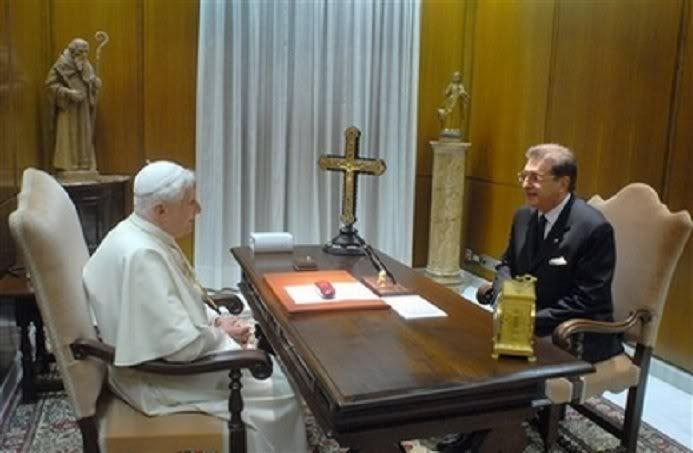
[Modificato da TERESA BENEDETTA 27/03/2008 15:13] |
 27/03/2008 17:13 27/03/2008 17:13 |
|
| | | OFFLINE | | Post: 12.604 | Registrato il: 28/08/2005
| Utente Gold | |
|
  Allam & Allah:
Allam & Allah:
A war of ideas
An interview with George Weigel

March 25, 2008
At Easter Vigil Mass this weekend, Pope Benedict baptized Egyptian-born Italian journalist, Magdi Allam, who was born a Muslim. The conversion was an attention-grabber for obvious reasons.
National Review Online editor Kathryn Lopez took the news as an excuse for a quick check-in with George Weigel, biographer of the previous pope, and author, most recently, of Faith, Reason, and the War Against Jihadism: A Call to Action.
What’s the most important message about the war we’re in coming out of Magdi Allam’s conversion from Islam to Catholicism?
The war against jihadism is, among many other things, a war in defense of religious freedom, the first of human rights. That war is, at bottom, a war of ideas — of different ideas about the human person and different ideas of human obligation.
Magdi Allam has courageously defended the religious freedom of all while sharply criticizing those currents of thought in Islam which would deny the right of religious conversion to Muslims. Now he fights the war of ideas from a different foxhole, so to speak.
Who, among Muslims, should be held up as to encourage those who want to fight jihadism?
The kind of Muslims who will be our most effective allies in the war against jihadism are those Muslims who want to make an Islamic case for tolerance, civility, and pluralism.
The temptation to think that the answer to the problem of jihadism is the conversion of 1.2 billion Muslims to Western liberal secularism ought to be stoutly resisted as the ivy-league fantasy it is.
The question is whether, and how, Islam can effect what Christian theology would call a “development of doctrine” on issues like religious freedom and the separation of religious and political authority in a just state. A lot of 21st-century history is riding on the answer to that question.
Should we be worried about riots in the streets of Rome given his prominent baptism by the Pope?
During a recent work period in Rome I was regularly reminded that the normal patterns of Roman street life could well be classified as riotous, at least by other cultural standards.
Seriously, though, I would hope that the Italian authorities would take firm steps to ensure that a man’s act of conscience in a religious matter, freely undertaken, should not become the occasion for civil disturbances.
Is Islam the enemy? Or just Osama bin Laden’s version of Islam?
Bin Laden’s Islam is the enemy of those Muslims who do not share bin Laden’s conception of what Islam requires, as well as the enemy of the rest of us.
Has Pope Benedict been an important voice in this war? Is he being listened to?
I think Benedict’s Regensburg lecture of September 2006 was the most important papal statement on a public question of global consequence since John Paul II’s 1995 U.N. address in defense of the universality of human rights.
As I put it in my small book, Faith, Reason, and the War Against Jihadism, the Regensburg Lecture identified the linked problems at the center of a lot of turbulence in world politics today: the detachment of faith from reason (as in jihadism) and the loss of faith in reason (as in much of western Europe and too much of American high culture).
The former leads to the notion that God can and does command the irrational, such as the killing of innocents; the latter leaves the West intellectually disarmed in the face of the jihadist challenge.
At Regensburg, the Pope also gave a pluralistic world a vocabulary with which to deal with these grave problems: the vocabulary of rationality and irrationality. Whether these issues are understand in the world’s chancelleries and foreign ministries in the terms in which the Holy Father understands them is another question altogether.
Is there a message about the war you expect he’ll be bringing with him to the U.S. next month?
I wouldn’t be surprised if the Pope spoke at the U.N. about the natural moral law — the moral truths we can know by reason — as a kind of global “grammar” by which the world can rationally discuss the world’s future. And that has everything to do with the war against jihadism.
Do we deserve to win if we wind up electing Hillary Clinton or Barack Obama president?
Whether we deserve to win or not, we’re much less likely to win with a president who manifestly does not understand the nature of the enemy or the multifront struggle in which we are necessarily engaged.
A return to the Nineties — to foreign-policy-as-therapy — is not going to see us, or the Magdi Allams of this world, through to a future safe for the exercise of religious freedom.
[Modificato da TERESA BENEDETTA 28/03/2008 06:48] |
 27/03/2008 22:40 27/03/2008 22:40 |
|
| | | OFFLINE | | Post: 12.609 | Registrato il: 28/08/2005
| Utente Gold | |
|
  Magdi Cristiano Allam's
Magdi Cristiano Allam's
contested conversion
The baptism of Magdi Allam has been criticised and denounced by the traditional Islamic world.
Among some Christians, there is fear of seeing a new crusade being launched by Benedict XVI and the Church.
But just as with the Regensburg address, the baptism was a message in defence of religious freedom,
of evangelisation and of co-existence between religions.
by Samir Khalil Samir, SJ
Beirut, Mar. 27 (AsiaNews) – Every year, during the Easter Vigil in St Peter’s Basilica, the Pope baptises a group of adults represetning all the continents, whereas on the feast of the Baptism of Jesus, the Pope traditionally baptises babies.
This year,seven adults were baptised at the Easter Vigil. One of them was a Muslim, well-known in Italy and abroad: Magdi Allam, deputy editor ad personam of the leading Italian daily newspaper, Corriere della Sera.
1. Magdi Allam and the evolution of Egyptian society.
Magdi Allam, born in Cairo (Egypt) in 1952, comes from a Muslim family. His mother was a devout women, his father more secularised. He was educated by Italian Salesians, who run Cairo’s most famous technical school.
Arriving in Italy in ’72, he continued his studies at Rome’s La Sapienza University. Following his degree, he embarked on his career in journalism, working first for La Repubblica, then for Corriere della Sera.
Increasingly, Allam specialised in the phenomenon of radical Islam, especially after September 11th 2001. His staunch opposition grew to this form of Islam which is violent, radical, intolerant and invasive. As the violence of this Islam became blinder and more widespread throughout the Muslim world, Arab and non-Arab, his opposition intensified.
It must be remembered that this form of radical Islam was born in the early ‘70’s in Egypt; in the undercurrents of the Muslim Brotherhood – founded in Cairo in ’28 – and that it strengthened itself thanks to the ideological and financial aid of Saudi Arabia and the Wahhabita School.
Egypt has radically changed in these past 30 years. And Magdi has taken note of this:
- All of the radio and television programmes have been islamified;
- Egyptian cinema, the most famous throughout the Arab world, has become puritanical and Islamic; not even the merest of negative allusions to Islam is accepted; films can no longer be made about the prophets from the Old Testament; religious television now concerns itself with all areas of life;
- Mosques are multiplying at an amazing rate;
- Tthe veil has now become all but compulsory; the niqab – which corresponds to the Afghan burka, covering the woman’s entire body except for her eyes – is increasingly becoming the norm.
In 2006 the Egyptian Minister for Culture Faruk Hosni afforded himself the luxury of alluding to the widespread use of the veil, saying that “I no longer recognise my country, it has become so similar to Saudi Arabia”.
In Parliament deputies linked to the Muslim Brotherhood demand his resignation based on the Constitution (inspired by Islamic sharia law). Crumbling under pressure, his ruling party invited him to resign. Faruk was saved at the last moment by the First Lady, Sawsan Mubarak.
All of this contributed to consolidating Magdi Allam’s opposition to this radical form of Islam. It is rooted in the Koran and in the attitude of the prophet Muhammad, but it does not correspond to the vision of the greater Muslim majority. These, however, are used to bending to the orders emitted by the imam, and accept this situation face down.
2. From Islamist violence to the non violence of the Gospel
This perhaps rienforced Magdi Allam’s distancing himself from his experiences of Islam, while leading him to the conclusion that the seeds of this violence are present in the Koran and in the tradtion of Mohammad’s sayings.
Some suspect that his choice was motivated by political ends, but I prefer to follow the principle set out by Saint Ignatius Loyola in his Spiritual Exercises, where he says that one must always attribute best intentions, the so called presupponendum, to the other person, even one’s enemy.
In his Easter Homily, the Pope, as the foremost representative of the Catholic Church, underlined that every person who has undertaken a spiritual journey and has been helped by a Christian community to verify his own reasons for his choice, must be welcomed into the Church.
The day after his baptism, Magdi Allam wrote a letter to his paper explaining the reasons for his choice, and why he was baptised by the Pope, etc...
Some Catholics reacted publicly by writing that baptism is a personal choice and as such should not be exposed in public. In his position, I perhaps would not have chosen to do so, but it is not incorrect to have done as he did.
What was for me somewhat out of joint was that he chose the moment of his baptism to continue his analysis of Islamic fundamentalism. He could have used it instead to communicate how Christianity is the fulfillment of Islam’s religious leanings.
This would have been invaluable: Contemporary Islam is heading full speed towards an intransigent integralism of vast proportions, while contemporary Christianity moving towards increased openness.
Moreover, conversion is not simply a break with the past (in this case with Islam). It is also a projection towards the new and the future. This other dimension, the discovery of Christianity and of a strengthening bond to Christ, is more intimate, but Allam did not speak of it [in his letter to his editor at Corriere della Sera published on Easter Sunday].
If his did, perhaps he would have risked more criticism from those who maintain that conversion is a private and personal matter.
His letter leaves room for a vision of conflict between Christianity and Islam, in the political, ideological and cultural aspects. But this is only one point in time. Christianity is the fulfilment of all that is spiritual and good in this world.
I have had diverse occasions to follow young Egyptian, Lebanese and Iranian Muslims who wanted to convert to Christianity. In many cases, the journey is begins with their desire to contrast the violence of modern-day Islam; then they discover that Christianity means peace and love. What strikes them most about the figure of Christ is the element of love, the giving of himself in the Passion and on the Cross, which oes beyond the Koran's story, in which Jesus escapes martyrdom.
Certainly Magdi Allam was not a practising Muslim, so his journey perhaps leant more towards the political and cultural. However to say that it is not authentic is going too far, and unjustified.
B. The absolute value of religious freedom
1. The freedom to abandon Islam and convert
His baptism however affirms the legitimacy of conversion. I believe this is why he wished to draw greater attention to his conversion: to affirm what is denied by the Muslim world.
Allam has written extensively regarding the case of the Afghan convert Abdul Rahman, taking staunch positions and affirming the right to conversion. Magdi wants to lend his support to a civilisation of human rights, represented first and foremost by Christian civilisation.
In Rome I know a few Muslim converts, who hide their conversion although they do not deny it. Magdi, being a public figure, felt the need to proclaim that he was a Muslim who had now become Christian. Tariq Ramadan [Europe-based Islamic scholar lionized by some Western liberals] went so far as to accuse him of being a Copt who passed himself off as Muslim.
According to Muslims, if you are born Muslim you remain Muslim, even if you distance yourself from the practise of the faith. This is why it is impossible to convert to another religion. Having reached perfection with the practise of Islam, the fullness of divine revelation given by God to the heart of Adam, but developed and culminating in the Koran, you cannot turn back. In the Koran, even Adam is Muslim.
This is how I understand the reaction of a person dear to me who wrote in the newspaper Repubblica on March 23: “There was no need to reject the love and faith for the prophet Mohammad in order to demonstrate love for Jesus. Within their doctrine, Muslims recognise the figure of Christ and the Virgin Mary ... This is why I fail to understand the choice to reject the tradition of the Islamic message: any form of apostasy is seriously perplexing”.
But I say: you cannot be Christian and Muslim at the same time, because there are irreconcilable points which divide them, at a level of dogma (Christ as the last revelation of God vs Muhammad as the “Seal of the Prophets” who brought God's last message to humanity); at an ethical level (the duty to forgive and love your enemy vs the non-duty to do so); at a historic level(that Christ died on the cross vs. he did not die and is still alive).
Muslims may have the ‘highest regard for Christ and the Virgin Mary” but the Christ of the Koran (however wonderful he may be) is not the Christ of the Gospel.
In the same way Abu Muhammad, commenting on Magdi’s baptism, writes from Gaza: “Islam is a great tent which gathers beneath it all religions and Celestial Books. We believe in all of God’s messengers and in all Books. We have a wide vision and an open spirit. Even the apostate must be criticised , so he may recognise true from false and discover that which he chooses to ignore”.
The same rebuke was voiced by the UCOII: “There is no Jesus-Mohammad contrast”. But the fundamental difference exists! Everyone is free to prefer one religion or the other. But facts cannot be ignored.
But along comes Magdi, to affirm through his conversion, that he prefers Christianity.
I have till now cited some of the polite responses from Muslims. But if one visits a Muslim website in Arabic, such as “islamonline”, there are many insults.
Badr refers to him as a “dog”; Metwalli says: “from communism to the crusades to the fires ofButnna”; Chérif calls him” vile” and scornfully congratulates him on becoming a Catholic; another writes “if God so desires he will die a non believer (kâfir) and so he will go to hell!”; “you have loved those who killed the prophets and the polytheists, so go to them!”. Ahmad writes: “Go to hell!” and Umm Ahmad writes from France: “Lets do our research: surely he is an Zionist Jew, or at most without origins!”. Abu Muhammad form Gaza invokes God to send him painful torture”. The litany is unending.
2. Freedom to convert even in a secularised world
Conversion and religion are also treated with distrust by the Western secularized world. Consider the 'scandal' which greeted French President Nicolas Sarkozy’s recent comments on Europe’s Christian roots and the need to rely on religions in order to regain lost secular values. Secularists claim that it was secular enlightenment which brought values to the world and not religion.
Benedict XVI’s Regensburg address aimed to complete the conquests of the Enlightenment by opening up its reasoning to the religious dimension. However he also added: this does not mean returning to the situation preceding the Enlightenment - his proposal is not a return to the past but a step forward [1].
Non-believers, who would not allow society to believe in any God, are against human rights. Therefore, while there is an Islamic brand of totalitarianism in today’s world, there is also a totalitarianism of an atheist secular nature.
If the religious dimension is not respected, then even matters of religion are interpreted in political or ideological terms.
Allam has often been criticised by Western secular intellectuals as someone who aims to provoke a clash of civilisations, either in favour of an Italian political party, or in favour of a foreign one.
Personally, even if I do not share all his opinions, such as for example his reading of the Israeli-Palestinian conflict, I do not believe that he is seeking a clash of civilisations.
He is fighting against violence when it hides behind religion, such as violence in the name of Islam, but he must also be against the violence of those who fight in the name of Judaism or Christianity.
[I would understand if Fr. Samir has anti-Israel sympathies, but in the interests of objective fact, the state of Israel is fighting for its existence as a state, not for Judaism. I don't think any Israeli leader has ever said that they are protecting and defending Israel in the name of the God of Abraham - I think they would be too conscious of not taking the Lord's name in vain to do that!]
C. Benedict XVI: The duty to evangelise with respect
1. Benedict XVI: Christianity is for everyone
The fact that Benedict XVI agreed to personally administer baptism to Magdi Allam was a surprise - even if he did so without ostentation, giving the same importance to all seven baptised, and not giving precedence or amy special attention to him. It is the media and biased observers who have made much of it, because they attribute a political significance to it.
But in doing so, Benedict XVI wanted to underline that everyone - Muslim, atheist, even Christians who have abandoned the faith - are all called to the faith.
He was affirming the universality of the Christian calling, not because we Christians are the largest religious group, but because Jesus's message is for everyone. Everyone has the right to know Christ. No one is excluded.
But the presence of a prominent Muslim among the catechumens who were baptized could not be missed by the Muslim world. Mjuslims are the most unforgiving about conversion away from Islam. And yet, with this action, the Pope is sending the message: You too are called to discover Christ and to enter into the Church, if you so desire.
2. Personal experience
For my part, I have experienced tragedy. Years ago I was in Morocco. A 35-year-old Moroccan teacher of Arabice came to visit me and spoke top me about the Gospel and Christ. After half an hour with him, I could not help expressing my amazement at his knowledge about Christianity. He said he had been seeking baptism for 14 years but he was always refused.
Hours later, I met with the bishop and a small community of priests and I told them of my encounter and I told them about him. One of the priests stood up and reprimanded me: “It is right to refuse him baptism. We don’t want to make any martyrs” [2].
After having revealed his reasons for caution, the priest berated me on how I had not understood the Second Vatican Council according to which everyone can be saved, even within their own religion, etc…..
I replied that the priest had no right to refuse baptism. If the Muslim seeks baptism, he can be warned of the risks he is running, he can be put on his guard, but he cannot be refused because he has been called by the Holy Spirit, and he is free, the choice is his. Before I left, the bishop thanked me for having clarified the matter.
The very next day I travelled to Marrakesh and met with the small community of friars and nuns who live there, I described the episode to them and my conclusions - that you cannot refuse a person baptism, even if he is Muslim.
All of them greeted my words with applause and cries of joy! They said that for years, they had been forbidden to draw close to Muslims and that the priests continued to refuse baptism to those who desired it. The priests feared that in retaliation, Catholic schools would be closed and mission activities endangered.
On another occasion, after having concluded Holy Friday ceremonies, I was about to close the Church door, when three young Muslims between 20-25 years of age asked me if they could enter the church. They did, and they asked me many questions about the Church, the covered images, and Christianity in general. Then the parish priest arrived and sent the young men away, saying: “We have no right to speak to them of the Christian faith”.
All of this points to a very serious fact. Not only do Muslims 'censor' Christian activities, But Christians themselves practise self-censorship, a point Magdi brings up in his letter.
I therefore think that the Pope’s gesture meant to say: The Church's mission is universal, even towards Muslims, and it must be explicit.
Sometimes, Christians advise against conversion for other reasons, such as to act as bridge between cultures. Even Cardinal Newman, when he was Anglican, thought the same way.
Butmission is mission: Once a non-Christian feels he is ready to take the step towards complete and explicit membership in the Church, he must take the step that his inner self suggests.
3. Benedict XVI: Reciprocity and mission
The final aspect is that of reciprocity in the duty to evangelise. The Pope and many Vatican documents underline that we Christians have the duty to announce the Gospel to everyone, and that everyone is free to accept it or refuse it.
How can we maintain the personal obligation to announce the Gospel while respecting the freedom of the other? The Church resolves this apparent contradiction by clearly stating that no one can be forced to convert.
As early as the 8th century, Arab Christian intellectuals wrote a treatise underlining that not only is violence forbidden in calling someone to the faith, but that moral and spiritual pressure is also forbidden. They were only too familiar with the financial, moral and physical pressures that they were subjected too in order to keep their faith!
Freedom to evangelise (tabshîr), and freedom to islamify (da’wa) must be guaranteed. Christianity, for me, is the most beautiful and perfect religion, and Islam, despite its many beautiful traits, is not the fulfilment of the divine project for man, it is not an appeal to humanism.
At the same time, I acknowledge that the Muslim is convinced of the contrary, and that is his right and duty. True reciprocal respect is when each person follows his conscience and increasingly tries to enlighten the other.
The Pope does not hide his certainty as a Christian that Muslims need one more step to reach the perfection of truth. But despite this, he neither attacks nor slanders Muslims.
And when a Muslim says to me “it is a shame you are not Muslim!” I understand that he holds me in deep respect. And my feelings towards him are the same.
This reciprocal respect is fundamental in order to build a peaceful coexistence between religions, but also with the atheist and secularist: a society in which each person is convinced of the truth of his position, but in which he is also convinced of the other's right to live this certainty and live it with me.
Conclusion:
The minimum common denominator remains human rights
In order for this to happen, a minimum common denominator is required: human rights. To give up on human rights is an error. This is why, the Vatican continues relentlessly to seek reciprocity of worship. Just as Muslims enjoy full religious freedom in European societies, Christians wish to be able to express their faith in freedom in Islamic nations.
And just as Muslims can call Christians to become Muslim in the West (and they do), istians must be free to call Muslims to become Christians in Islamic nations. Instead, many Muslim countries have reinforced their punishment of those who announce the Gospel; news from Algeria reminds us of this on a daily basis,
The Pope’s baptism of Magdi Allam is not an act of aggression, but an exigency of reciprocity. It is a quiet 'provocation' that serves to make us sit up and think. Each one of us must live as a missionary, attempting to offer to the other the best of what one has encountered and understood.
When I discover a good “product” it gives me joy to pass on the information to my friends. It is not an act of commercial propaganda, but of esteem and affection. Thus, the Muslim invites me with great simplicity to become Muslim and I invite him with simplicity to become Christian.
Two years ago two Iranian students who studied Arabic in Beirut came to ask me to explain Christianity to them; in turn I asked them about Islam. Then, at a certain point they told me : “Professor, we have very little time before we have to return to Iran, please let us content ourselves to speak only of Christianity”.
Benedict XVI’s gesture is a great leap for coexistence between peoples - not disdain or hostility towards those who think differently, nor the relativism of those have no certainties which is often expressed in gtreat intoleracne for those who do.
Footnotes:
[1] Islam too is in need of a movement of enlightenment, which existed in the IX-X century, only to be submerged under a current of religious traditionalism.
[2] The reference here is to the risk of being killed for “apostasy to Islam”, as happens in many Muslim nations.
|
|
|
|
|